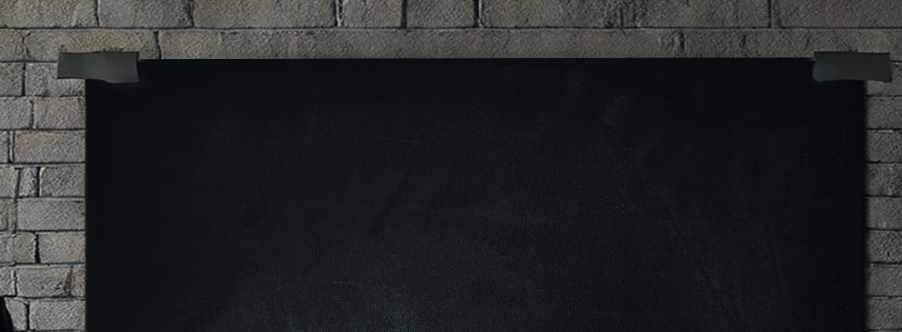FreeWeekly PaperoftheYear
The history of the UK’s first Jewish youth club Page 29 Rabbi’s wilderness therapy offers a Rosh Hashanah reset Page 16



The history of the UK’s first Jewish youth club Page 29 Rabbi’s wilderness therapy offers a Rosh Hashanah reset Page 16


‘Deep, systematic’ analysis of our output since 7 October needed, says Samir Shah
THE BBC’s coverage of Israel and its war with Hamas in Gaza should be subject to a “deep, systematic” review, according to the corporation’s chairman Samir Shah, writes Lee Harpin.
“The Israel-Gaza story is a very, very complicated story and there are very strong emotions on both sides,” he told the House of Lords’ Communications and Digital Committee.

“I chair the editorial guidelines and standards committee and that is part of the process where complaints are discussed, talked about and addressed.”
Shah said he believed that the conflict between Israel and Hamas should be the subject of the next “thematic review” conducted by the BBC.
Appearing alongside Shah on the committee, BBC director-general Tim Davie insisted that the corporation took every complaint about its coverage seriously, including against the BBC Arabic service.
He said: “We will look at that piece of research and take it seriously, in good faith. Every accusation we’ve had on the Arabic service we have looked at. Now, the issue is not everyone agrees with the outcome. We’ve taken disciplinary action.
“Broadly, I think we are doing a very good job and the research that we have into the overall public response is good. But that doesn’t mean we are perfect.”
Davie added: “We take complaints seriously. We’ll go through them and we won’t just be, frankly, in auto-

defence. But we also stand up for our journalists. We’ll stand up for people doing a good job.”
The pair spoke after a review driven by the use of artificial intelligence (AI) and published by a British lawyer, Trevor Asserson, who runs Israel’s largest international law firm, claimed that the BBC had downplayed the terrorism of Hamas.
It also claimed that the corporation had broken its own editorial guidelines more than 1,500 times in its reporting of the conflict.
Responding to the findings, the BBC said it had “serious questions” about the methodology of the report.
In Tuesday afternoon’s session Shah was asked about how the corporation was responding to complaints about its coverage of the Middle East.
“The current Middle East conflict is one area we should consider very seriously to be subject to a deep, systematic analysis of how we cover it,” said Shah. “It’s a very di cult story. In Continued on page 9

Chai Cancer Care this week welcomed the Princess of Wales’ decision to release a video about completing chemotherapy. Chief executive Lisa Steele said: ‘The princess’ brave and honest message will provide comfort and inspiration to all those affected by cancer. Hope prevails through the toughest times’
Kamala Harris and Donald Trump clashed over the war in Gaza during Tuesday’s presidential election debate.
The Democratic hopeful said Israel’s fight against Hamas was justified but the war “must end immediately,” in part because of how many Palestinians have been killed.
Trump predicted that if Harris wins, Israel would disappear “in two years”.
Moderators at the evening debate in Philadelphia asked Harris to explain her repeated claims that Israel has the right to defend itself, but also that “it matters how” it conducts the war. She made the same arguments she has in the past, saying she would ensure Israel could defend itself and that she believed Hamas was to blame for the war.
“Let’s understand how we got
here. On 7 October Hamas, a terrorist organisation, slaughtered 1,200 Israelis, many of them young people who were simply attending a concert, women were horribly raped, and so absolutely I said then, I say now, Israel has a right to defend itself. We would,” she said. She continued: “How it does so matters, because it is also true far too many innocent Palestinians have been killed — children,
mothers. What we know is that this war must end. It must end immediately.”
Trump, as he has before, claimed the 7 October attack would not have happened on his watch because of sanctions he placed on Iran, which funds the terror group. He said Iran was “broke under Donald Trump” and unable to fund its other proxies including Hezbollah in Lebanon.
A crowd of about 200 people gathered outside the Foreign O ce on Tuesday evening for a rally against the government’s decision to suspend 30 arms export licences to Israel, writes Jenni Frazer.
Waving Israeli, British and flags reflecting pre-revolutionary Iran, the crowd chanted “shame!” and booed mentions of David Lammy and Sir Keir Starmer, who were accused of “betraying Israel”, against warnings that it was not just Israel under threat, but the whole western world.
Rabbi Joseph Dweck, of the S&P Sephardi Community, said: “What is at stake here is not just the survival of Israel. This is about everything that we hold dear and cherish in the west, about life and liberty.
“We are dealing with a death cult of jihadists who are eager to die, who are eager for their children to die and who will, wilfully, gleefully, give up their lives in order to destroy everything. If this country,

this government, is not aware of that, there are much greater problems than they deem that they have.
“The withholding of arms to Israel is not just a punch in the gut to Israel,
and to the Jewish people. It is an opening of their arms to Hamas, to the Islamic state and all the jihadist groups. It has been said many times: when they tell you what they aim to






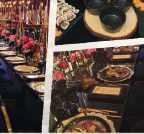


do, believe them”. And Rabbi Dweck had a special message for the prime minister: “Sir Keir, don’t be taken hostage by Hamas.”
Featured speakers included Vladimir Bermant, a businessman who is the founder of the Military Experts Panel, just returned from taking a group of generals from Britain and five other Nato countries to Israel. He said the group had surveyed the IDF’s rules of engagement — “and concluded that they are ‘best in class’”.
The group had had briefings from senior Israel Defense Forces o cers and had visited Gaza to see for themselves the “challenging operating environment” for the Israeli forces.
Bermant quoted the Conservative politician and former trade secretary Kemi Badenoch, who had claimed that the decision to suspend 30 arms export licences was political, rather than being based on a legal framework.
“The decision was political and politicised. Kemi knows the claim of legal justification was only an excuse. We say, ‘Reverse the arms embargo now.”
Other speakers included investigative researcher David Collier and Jewish News writer Nicole Lampert.
A last-minute addition to the line-up of speakers was the British-Iranian dissident known as Lily Moo, a devoted friend of Israel, who urged the crowd to put pressure on the government to proscribe the Iranian Islamic Revolution Guard Corps (IRGC).
The rally took place next to the Whitehall encampment of the Iranian dissident Vahid Beheshti, who has been campaigning for proscription of the IRGC for months.
The event was organised by the Stop the Hate group in conjunction with the 7/10 Human Chain project. • Jewish peer backs arms move, p4
An “outrageous” motion uncritical of Iran regime and failing to acknowledge the 7 October Hamas attacks has been tabled for debate by TUC Congress, writes Lee Harpin.

The ‘Stop the escalation of war in the Middle East’ emergency motion was submitted by the Universities and College Union, which represents lecturers and further education sta .
It accuses Britain, Israel and the United States of supporting a “deadly war with Iran” and suggest next month represents “a year since Israel launched an onslaught against Gaza”.
In language that sides with Tehran, the motion “notes” what it claims is “Israel’s bombing of Lebanon, Syria and its attacks on Iranian territory”. The UCU motion, seconded by the train drivers’ RMT union, is submitted for debate on the same day Palestinian ambassador Husam Zomlot is due to address delegates in the main hall at the conference in Brighton.
Steve Scott, of Britain Israel Trade Union Dialogue, told Jewish News: “The ‘emergency motion’ from the UCU is frankly astonishing.
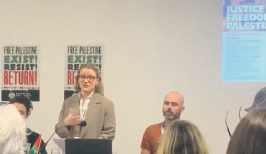
“Not to mention the horrific massacre that took place on October 7th 2023 as instigating Israel’s response in this terrible conflict is again an insult to the intelligence of trade union members as well as the victims of Hamas terrorists.
“The uncritical support for the Iranian regime, who go against everything that trade unionists hold dear in their principles as well as their malign influence and violent ideology in the region is outrageous.”
Without referencing the 7 October atrocity the motion says: “We will mark a year since Israel launched an onslaught against Gaza in October.” The motion then calls for the TUC to recognise: “The Israeli bombing of Lebanon –with the support of Britain – is a significant and qualitative escalation.”
It adds: “After over 40,000 Palestinians killed, Israel’s escalation threatens a much wider war in the Middle East that will lead to far greater death, destruction and instability in the region.” It then calls for delegates to “condemn the bombing of Lebanon and attacks on Iranian territory” and to “oppose any attempts to escalate this war and demand a ceasefire now and support the call for a UK-wide workplace day of action in support of an immediate ceasefire.”
On Tuesday Jo Grady, UCU’s general secretary, spoke at a fringe event orgainsed by the Palestine Solidarity Campaign. Jewish News understands that the UCU motion has been met with dismay by many moderate delegates.
Keir Starmer became the first PM in 15 years to speak at the TUC conference on Tuesday.
The UCU has been contacted for comment.
Foreign secretary David Lammy has said there can be “no role for Hamas” in Gaza, writes Lee Harpin.
He also told a press conference in London with US secretary of state Antony Blinken he did not want to o er an assessment ahead of an International Criminal Court decision on the application of arrest warrants for Benjamin Netanyahu.
On plans for Gaza once the conflict ends, he said: “There can be no role for Hamas going forwards.”
Both men were also asked for their view on the ICC arrest warrant case, with a decision expected in days. Lammy said: “I think the important thing to stress in great democracies such as ours is our belief in the separation of powers.
“There is an important forum for politicians and those who represent the people. We’ve always been clear in the

UK of our belief in the international rules-based order.”
Lammy said of the decision on arms: “We believe in international law … but these must be decisions for the international courts to determine. I don’t want to comment on the assessment... I’m going to leave it to the lawyers. It’s a very complex matter.”
Blinken and Lammy dis-
cussed available options to ease Israeli security concerns around any possible withdrawal from the Philadelphi Corridor running along the Gaza-Egypt border.
Egypt has insisted the IDF withdraw at the first stage of a ceasefire deal with Hamas, a demand rejected by Netanyahu on security grounds.
In advance of Tuesday’s

BY ANDREW FREEDMAN CORPORATE & FINANCIAL COMMUNICATIONS ADVISER
The heartbreaking news about the murders of Hersh Goldberg-Polin, Eden Yerushalmi, Alex Lobanov, Almog Sarusi, Carmel Gat and Ori Danino cast a pall across global Jewry. Every Whatsapp, call or slice of social media made reference to it. The despair. The horror. Even the weather in Tel Aviv made its own pathetic contribution with grey skies and rain on the last day of August.
But this latest iteration of Hamas’ barbarism produced, largely, the sound of silence. Ambivalence. The qualifications, the omertà surrounding Israel and its citizens’ plight.
And while the front covers of some UK national media outlets published the faces of Hersh, Eden, Almog, Alexander, Carmel and Ori, the minutiae of the individual, the sanctity of their own selves, becomes lost amid the sheer number of lives snatched. They are de-personalised: they are known simply as “the hostages” and end up being tarred with a political brush in death that may well have been anathema in life.
And whether attending a music festival or simply being in the wrong place at the wrong time as a citizen in your own country, somehow all individuality of mass victims of terror becomes airbrushed by the weight of the atrocity. They each had likes, hopes, worries, fears, dreams. Each had his or her own identity
and each one of them had Israeli citizenship.
But what does it mean to be a citizen? Certain rights are presented to you and in particular for Israel, it’s “Basic Law”, which constitutes some of the state’s quasi-constitutional character. There is a particular clause dubbed the “worthy clause”. It reads as follows: “The state will strive to secure the welfare of members of the Jewish people and of its citizens who are in straits and in captivity due to their Jewishness or citizenship.”
Prime minister Netanyahu has been quoted as saying maintaining an Israeli presence on the Philadelphi Corridor was a “strategic, existential issue”. And he may well be right from a military, operational perspective. But what about the other existential perspective: the obligation of the state to secure the welfare of its citizens who are in captivity? Fulfilling the covenant of the State, the “worthy clause”? This is not to diminish the importance of Israel’s presence on a tiny, narrow strip of just 11 miles: Hamas understands its importance as it has already used it to pernicious ends.
And while this all makes sense rationally, for Israel’s citizens, for the Jewish people, for its heart, there is something out of joint. Because all we want is for our parents, our children, our brothers, our sisters, our friends, to come home, because that is where they belong.
And the state’s moral, almost sacred duty to protect its citizens can, to some, appear to be in a corridor far narrower than a mere 11 miles.
It is no accident that Israel’s national anthem, Hatikvah, means ‘The Hope’. Netanyahu must ensure that while he continues to maintain security, its people maintain hope.
talks the Foreign, Commonwealth, and Development
O ce said Lammy welcomed Blinken as part of strategic talks on the future of the “special relationship”.
It was also intended to progress a UK-US commitment to a long-term peaceful settlement in the Middle East and enabling a two-state solution.
Lammy said the UK had “no greater friend” than the US, adding: “The special relationship has been cherished on both sides of the Atlantic ... but we are committed to supercharging our alliance to bring security and growth to Brits and Americans alike.”
“In a more volatile and insecure world, it is even more important that we are highlyaligned nations.”
Keir Starmer is due to fly to Washington tomorrow for further talks with President Biden.
• Editorial comment, p20
An Islamist activist at the centre of a new elected pro-Palestine MP’s campaigns has been jailed for attempts to spark “immediate unlawful violence”.
Majid Novsarka, also known as Majid Freeman, was sentenced to 22 weeks in prison at Westminster Magistrates’ Court after being convicted of public order o ences. It followed riots that flared in his home city of Leicester in September 2022.
Freeman, 36, was previously at the centre of the pro-Palestine MP Shockat Adam’s election campaign in Leicester South, in which Adam ousted Labour’s Jonathan Ashworth on 4 July.
Riots erupted in Leicester on 17 September 2022 over tensions between Muslim and Hindu communities.
Jewish News understands Freeman was found to have circulated false claims about local Hindus with the intention of provoking local

Muslims. The court decided Freeman intended “immediate unlawful violence” and had used “abusive words with the intention that violence would be provoked” as unrest flared in the city.
In a statement released after he was jailed, Freeman claimed: “I should have never stood trial for defending the Leicester community.”
When he campaigned for independent MP Adam ahead of the July election, Freeman was filmed harassing Labour’s Ashworth with a camera over the MP’s stance on Gaza.

A senior Jewish peer has backed Keir Starmer over the controversial decision to suspend some arms export licences to Israel, and claimed the previous Tory government had failed to follow similar advice, writes Lee Harpin.
In a major intervention, crossbench peer Lord Carlile, who sits on the all-party committee for Israel, said the prime minister had shown “courage and conviction… however di cult it is” with the move.
Writing for The Independent, Carlile, who has been a vocal critic of the BBC over allegations it is biased against Israel, said: “The legal advice relied upon by Sir Keir Starmer and David Lammy has long been known to senior UK ministers.
“Sitting on clear legal advice for more than a very short time cannot be justified. Starmer has shown courage and a conviction that the right thing must be done – however di cult it is.”
Carlile, the independent reviewer of terrorism legislation between 2001 and 2011, also claimed former foreign secretary Lord Cameron received the same legal advice as that acted upon last week by present holder of the o ce David Lammy but chose not to act on it. The claim was denied by a source close to Cameron.
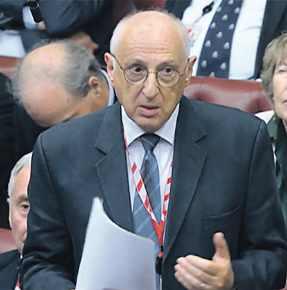
Carlile, a barrister, also described Starmer as “one of the most able, analytical lawyers of his generation” and said former prime ministers such as Boris Johnson “should have known better” before making “wildly disproportionate” criticism of the decision.
He also said he was “dismayed” by attacks by communal leaders on the suspension of a limited number of arms exports, noting that Italy, the Dutch courts, Spain and Canada had all reached often harsher verdicts on arms sales to Israel.
“It is crucial that the rule of law – which prevents the abuse of state power and applies to all – is not shouted down in an unruly way by people who are acting on prejudice dressed up as principle,” the peer added.
“It is insidious that democracy, brought about by parliamentarians doing exactly what legal advice dictates, should be hijacked by populist sloganeering – especially when that comes from former prime ministers like Boris Johnson, who should know better.” He also strongly condemned Israeli prime minister Benjamin Netanyahu over the continuing conflict in Gaza.
“His stubborn resistance in recent months to sound advice given by IDF commanders, by the families of hostages who remain unaccounted for, and by senior international figures including the president and vice-president of the USA, to many of us signifies a person no longer fit for high o ce,” Carlile said.
• Fresh sanctions on Iran, page 6
Three Barnet Labour MPs have written an unprecedented letter to David Lammy, expressing “deep concern and upset” from their constituents over the decision to suspend some arms export licences to Israel.
A letter signed by MPs Sarah Sackman, Dan Tomlinson and David Pinto-Duschinsky confirmed that in each of their three seats “constituents have been in touch and expressed deep concern and upset about Monday’s decision.
“They have asked that we express their concerns to you, so that the government can better understand their point of view.”
The MPs for Finchley and Golders Green, Chipping Barnet and Hendon said that “many constituents are upset and angry about the timing of the announcement which, as you know, came shortly after the murder of six hostages by Hamas terrorists. There was particular anger that the announcement itself coincided with the funeral of one of the hostages, Hersh Goldberg-Polin.”
The letter added that constituents had “raised questions about the message that the decision sends to Israel’s enemies, including Hamas, Iran and Iran’s proxies.”
A pro-Israel legal advocacy group has written to the UK government threatening action over the decision to suspend 30 licences for arms exports to Israel, writes Lee Harpin.
Jonathan Turner, the chief executive of UK Lawyers for Israel, is claiming “there is a strong case that the government’s decision was unlawful”.
He alleged: “In truth, it was a political decision to appease members of the public who hate Israel based on misinformation and biased media coverage of the war.
“As such, it was a misuse of the power granted by the legislation.”
The claims are likely to be
disputed by the government, with attorney general Richard Hermer KC, who approved the limited suspension of arms expert licences, recognised as an expert in international law.
The letter notes the government’s decision is based on criterion 2c of the Strategic Export Licensing Criteria (SELC).
This says that the government will “not grant a licence if it determines there is a clear risk that the items might be used to commit or facilitate a serious violation of international humanitarian law”.

One factor taken into account was the claim Israel could have done more to ensure humanitarian assistance reaches the Gaza population.
The Greens have passed a motion at their annual conference proposed by a pro-Palestine grouping within the party describing Israel’s actions in Gaza as a “genocide”.
Meanwhile deputy leader Zack Polanski has called for a total ban on arms sales to Israel, claiming the UK government is complicit in violence in the Middle East.
The main motion branded Israel’s assault on Gaza a “genocide” – and declared support for the anti-Israel Boycott, Divest and Sanctions (BDS) movement.
It said: “We a rm our commitment to supporting BDS in our internal and external communications going forward. Supporting the BDS movement is essential to holding Israel accountable.”
Former home secretary Suella Braverman should not have publicly lambasted the Metropolitan Police as she pressured the force to ban a pro-Palestinian march, a watchdog has found.
The report by chief inspector of constabulary Andy Cooke said Braverman’s comments on the Armistice Day march, in which she accused the force of bias and playing favourites in policing protests, should have been delivered in private if deemed appropriate.
Braverman’s remarks led ultimately to her dismissal from the last government.
In his findings in the just-published report, which Braverman herself had ordered, Cooke also details how police chiefs warned they were often subject to “improper” interference from significant political figures.


Are you passionate about Jewish traditions and festivals, and sharing that knowledge with the next generation?
Come and join the team at Bright Horizons Nursery and Preschool, based within the JW3 Jewish Community Centre in North London –located short walking distance from Finchley Road, Finchley Road and Frognal, and West Hampstead tube and mainline train stations.
Scan the QR code or email us at jointheteam@brighthorizons.com to learn more and apply.
At Bright Horizons,


JW3 Building, 341-351 Finchley Road, Hampstead, London, NW3 6ET
Finchley Road and Frognal 3 minute walk
West Hampstead Station 8 minute walk
Finchley Road Station 8 minute walk
Hampstead 15 minute walk
The UK this week announced significant new measures against Iran and Russia following Tehran’s transfer of ballistic missiles there, writes Lee Harpin.
In coordination with international partners, the UK said it was cancelling bilateral air services arrangements with Iran, which will restrict Iran Air’s ability to fly into the UK.
The move follows repeated warnings from the UK and its international partners calling on Iran to cease its planned transfer of the deadly weapons to Russia.
Foreign Secretary David Lammy said: “Iran supplying Russia with ballistic missiles to fuel its illegal invasion of Ukraine is a significant and dangerous escalation.
“We have been clear in that any transfer of ballistic missiles by Iran would face a significant response. Alongside our international partners, we are calling out this behaviour and its attempts to undermine global security.
“Iran must stop supporting Putin’s unprovoked, premeditated and barbaric attack against a sovereign democratic state. The UK will stand with Ukraine for as long as it takes.”
The UK and US announced co-ordinated sanctions against Iranian and Russian individuals and organisations, with Russian cargo ships also sanctioned for their role in transporting
Education secretary Bridget Phillipson has told MPs her decision to pause the previous government’s academic freedom of speech laws was influenced by concerns raised by Jewish groups about the unintended spread of “Holocaust denial” on campuses.
Phillipson said: “I was concerned about what I heard from Jewish groups and other
military supplies from Iran to Russia. The UK statement reiterated the action was a response taken in co-ordination with international partners to expose Iran and Russia’s attempts to undermine global security, warning Russia’s intent was to cause further humanitarian devastation and loss of life in Ukraine.
The UK also issued a joint statement together with France and Germany condemning the transfer of ballistic missiles to Russia and outlined the necessary steps being taken in response.
Transport Secretary Louise Haigh said: “This government stands firmly with the people of Ukraine. “We will continue to use every lever at our disposal to put pressure on Iran to end its support for Putin’s illegal invasion, which is why we have begun the termination of all direct air services between the UK and Iran.”
Meanwhile, MPs and Jewish Labour groups this week put new pressure on the government to proscribe Iran’s Islamic Revolutionary Guards Corps (IRGC) in the aftermath of last week’s anger over the suspension of some Israel arms licences.
Labour sources suggested to Jewish News the government is looking at ways to amend existing laws to put targeted proscription-style restrictions on the operations of state-linked
minority communities about the unintended consequences that might follow from the legislation.
“That’s why I paused the commencement with a view to getting this right – making sure we protect academic freedom, but avoiding the situation where hate speech is allowed to flourish on campus.”
The Sunderland MP added

organisations such as the IRGC, with Labour Friends of Israel director Michael Rubin leading calls for proscription of the arms of the Iranian state.
Rubin said: “Tehran’s terror army is not simply responsible for suppressing the people of Iran and spreading violence and bloodshed throughout the region; it also poses a clear and present danger to Britain’s security.
“It is seeking to propagate extremism and antisemitism while plotting to murder the regime’s opponents on British soil. After years of Tory foot-dragging, we urge Labour to institute a ban as swiftly as possible.”
Jewish Labour Movement chairman Mike Katz added: “We’ve long advocated for action on the IRGC. The previous government dithered on the IRGC. This can’t continue.
“Now more than ever, Labour need to match
rhetoric on Iran with action and send the reassurance the Jewish community in particular wants to see by proscribing IRGC.”
Elsewhere, North Durham MP Luke Akehurst added: “In opposition, Labour called for proscription of the IRGC.
“I’m very strongly urging ministers to now act on this and ban this dangerous terrorist organisation which is a threat to British interests in the Middle East and potentially a security threat here in the UK.”
The renewed calls came after Middle East minister Hamish Falconer told Jewish News: “I am under no illusions about the threat that Iran poses not just to Israel, but to global security and to the UK. There’s lots I can’t discuss, but I would expect you would see more from the British government about seeking to manage Iran’s behaviour in the coming period.”
universities should be places in which a wide range of views are discussed, some of which may prove difficult or which some people didn’t agree with.
Pressed by Conservative MPs who claimed her decision represented a threat to free speech, Phillipson said she believed retaining academic freedom was “incredibly important”, but added she

would not want to see a situation arise in which “hate speech including Holocaust denial was spread on campus”.
The decision to pause the implementation of the Higher Education (Freedom of Speech) has been welcomed by communal groups including the Board of Deputies, the Union of Jewish Students and the Antisemitism Policy Trust.
Lord Mann, the government’s antisemitism adviser, also delivered a strong attack on the consequences of the laws in relation to Jewish students.
But Jewish News understands some communal figures have raised concerns about pausing the legislation, intended originally as a response to claims of “cancel culture” at universities.

MARK 7 OCTOBER EIGHT ARRESTS AT LATEST DEMO
Manchester’s Jewish community will mark the one-year anniversary of the 7 October Hamas atrocities with a march and rally on Sunday 6 October, with hundreds expected to gather in the city centre at 11am.
Raphi Bloom, co-chair of event organiser North West Friends of Israel told Jewish News: “Israel is under attack from all sides and Zionists are being blamed for everything bad happening in the UK.
“We are calling on the Jewish community of Manchester and the north-west, together with our dear nonJewish friends and supporters, to gather together to march through – and rally in – Manchester city centre.
“We want to show our loud and proud support for the state of Israel and the soldiers of the IDF, to call for the immediate release of all the hostages, to remember and mourn the thousands of people brutally murdered on 7 October and later on in captivity and to say loudly ‘Never Again is Now’.”
Eight people were arrested as pro-Palestinian demonstrators marched through central London in protest at the ongoing conflict between Israel and Hamas.
Thousands of campaigners set off from Piccadilly Circus shortly after 1.30pm last Saturday, with the procession passing alongside Hyde Park before ending on Kensington Road.
Police said in a post on X six of the arrests related to people participating in the march for racially aggravated public order offences with signs and a gesture, criminal damage and assault.
The other two arrests were of counter-protesters who were held on suspicion of breach of the peace and assaulting police officers, the force said.
The march was halted briefly when at least two counter-protesters, including one holding up a sign reading “Hamas is terrorist”, blocked its progress outside the Park Lane Hotel near Green Park.
Pre f ilm activities: 2pm / Film screening begins: 3pm S unday 22 September
MEDIA PARTNER:

Tickets: Child £17 / Adult £7

Location: Hertfordshire
For tickets visit jewishcare.org/events
For more information please contact clare.falk@jcare.org
At the outgoing of the Sabbath we first approach you Choral Midnight Selichot
NW London Venue Details will be supplied 48 hours before the event.
Saturday Night 28th September 2024
Motzei Shabbat 26 Ellul 5784 11pm | Doors open 10.15pm
Introduction by Rabbi Dr Michael Harris Service conducted by Rabbi Lionel Rosenfeld & Chazan Jonny Turgel with The Shabbaton Choir
Musical Director Harry Style Boy Soloists Joseph Abramson and Aaron Cooperman
Registration required: Please scan the QR code, or www.theus.org.uk/HASSEL24

by Jenni Frazer
The BBC breached its own guidelines on impartiality and accuracy in its reporting of the Israel-Hamas war on 1,553 occasions, according to a report released this week fronted by the British-Israeli litigation lawyer Trevor Asserson.
Speaking at the press launch of the 200-page report, Asserson challenged the broadcaster’s immediate response, which expressed “serious concerns” about the methodology of the investigation.
As well as using standard litigation measures and assessment of language used, this has employed AI and “deep dive” data analysis.
At the same time as complaining about the methodology, Asserson said, the BBC said it had “not had time to study the report in detail”.
The lawyer noted the corporation had had the report “for a few days” and its response – which he called “petulant” and “childish” –was “designed to undermine the credibility of the work”.
In detailed analysis of the BBC’s television and radio output between 7 October 2023 and 7 February 2024, Asserson’s team of researchers, lawyers and data scientists uncovered a situation “far worse” than they had expected when they began.
Asserson said had a sense “that the BBC was getting the story badly wrong”. He did not, however, realise how wrong until the figures — from analysis of BBC reports in English and Arabic — suggested that there was “an overwhelming disparity in the perception of the two sides, with sympathy for Palestinians vastly outstripping sympathy for Israelis,

even shortly after the massacre of 7 October 2023”.
What was often blamed on reports made “in the fog of war” as a BBC defence did not stand up when looking at the BBC’s own complaints procedure, Asserson said. Almost no apologies or corrections of reports showing bias against Israel appeared in the BBC’s own
corrections and complaints procedure. This, in turn, led to “a negative feedback loop”, with senior management concluding that if there were few or no corrections, then, broadly speaking, it was getting things right.
Speaking to Jewish News, Asserson said he was not ready to conclude that the bias in reporting was due to antisemitism. “I don’t want,
as Queen Elizabeth I said, to find the windows into the souls at the BBC. I don’t care what they think. Everybody has their own personal basis about everything. That’s not the issue.
“I care about legal obligations, for which the British public pay it to be fair and impartial, and breaches of those legal obligations. I think
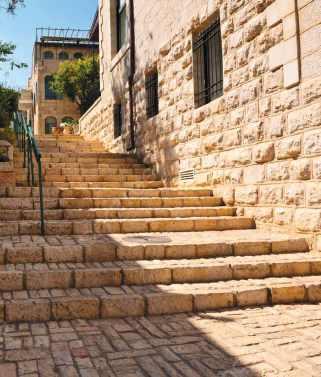














that some of those breaches occur through pure negligence.”
He did not believe, he said, there was any kind of editorial briefing within the BBC which said “let’s get Israel”. He had spoken to “very senior people” who had said they “wished that they were doing a decent job. But we are in a situation where the BBC is utterly failing in its obligations, because it is not controlling its output”.
Among the report’s findings, Israel came off worse in BBC Arabic output compared with English-language output and was more likely to be accused of war crimes — 592 times in the four months surveyed, compared with 98 for Hamas.
On the BBC’s refusal to call Hamas a terrorist group, the report said: “Although Hamas was responsible for the massacre of 7 October and numerous previous terror attacks, the BBC has repeatedly failed to report on it accurately. Hamas is referred to as a terrorist organisation in just 7.7 percent of instances, and is significantly more likely to be referred to as a health ministry”.
If the BBC did not respond with a serious overhaul of its procedures, Asserson said, “the next step may be to apply for a judicial review”. He believed “the rentamob” on the streets were encour-
aged by misleading reports by Western journalists, including the BBC, and called for the broadcaster’s Editorial Complaints unit to be made “independent of the editorial team in the BBC, and given power to express criticism”.
But Asserson said he also believed that there were lessons for Israel in the report’s findings.
“Can Israel do a better job? It is extraordinary that we are in a world where social media is dominating the airwaves and certainly the attitude of the young. Israel is one of the strongest technology countries in the world and it is utterly failing to grasp this particular nettle,” he said.
“I have no great words for this
[Israeli] government, which I think in some respects is a disgrace to the country. But the country is still an open, democratic, liberal society, with an independent judiciary, a free press, representative government and freedom of expression… Whether or not you like the government, it could do better on this particular topic”.
The BBC said it had “serious questions” about the methodology of the report, adding: “We don’t think coverage can be assessed solely by counting particular words divorced from context. We are required to achieve due impartiality, rather than the ‘balance of sympathy’ proposed in the report, and we believe our knowledgeable

and dedicated correspondents are achieving this, despite the highly complex, challenging and polarising nature of the conflict.”
However, the company added, “we will consider the report carefully and respond directly to the authors once we have had time to study it in detail”.
The statement noted that the most recent research showed audiences were significantly more likely to turn to the BBC for impartial coverage than any other provider, with independent research finding the highest proportion of people thought BBC coverage of the Israel-Gaza story “mostly neutral”.
On claims in the report of reporter bias, specifically in the naming of Jeremy Bowen and Lyse Doucet, the BBC said: “We strongly reject the claims that our reporters ‘celebrated acts of terror’ and we strongly reject the attack on individual members of BBC staff, all of whom are working to the same editorial guidelines.”
Asserson led the report in collaboration with Dr Haran ShaniNarkiss and other data scientists. It is a first project from the new Campaign for Media Standards, committed to redressing “significant systemic imbalance and promoting accuracy in journalism”.

Continued from page 1 my time — and I’ve been doing it for 40 years — this is one thing that has really resulted in lots and lots of concern on all sides.
“I think it’s the duty of the board, because the BBC plays such a big role in reporting on the Middle East conflict to the rest of the world, that we do take time out and do an analysis, a review, of that coverage.”
Director-general Davie (pictured) told the the House of Lords’ Communications and Digital Committee: “I think we are doing a very good job. The research that we have in terms of the overall public response is good but that does not mean we’re perfect.
“We will treat these complaints seriously and we won’t be in autodefence. But also, we will stand up for our journalists.”






The Board of Deputies has released its draft plan for the next three years — a five-point programme under the umbrella title A Brighter Future for the UK Jewish Community, writes Jenni Frazer..
On the Board’s agenda are detailed plans to tackle antisemitism, stand up for peace and security in the Middle East, defending Jewish religious freedoms, trying to make the community more united and inclusive and celebrating British Jewish faith, heritage and culture.
Echoing the King’s Speech to parliament, the Deputies’ plan sets out what new president Phil Rosenberg and his team of honorary officers hope to achieve in the next triennium, the current electoral term. There are 300 elected Deputies representing 200 Jewish communities nationally.
Rosenberg said: “The plan displays the fresh ideas, energy and drive of the new team. We have hit the ground running with a clear sense of mission and purpose. There is no doubt that our community finds ourselves at an inflection point, but we have resilience in our DNA, and I am determined that we will come back stronger. We look forward to working with deputies and all parts of our community towards a brighter future for the UK Jewish community.”
Among the most interesting initiatives are the Board’s plans for celebrating British Jewish culture.
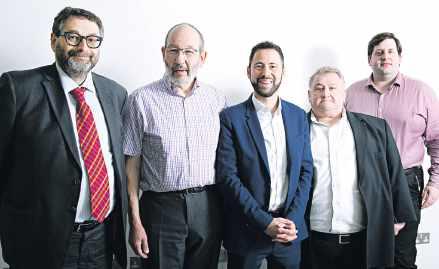
Ideally it is hoped to involve as many grassroots deputies as possible in the activism envisioned, which include plans for a heritage plaque scheme to mark key events and individuals in UK Jewish history, and, working with Jewish cultural institutions around the country, to develop a programme to celebrate the community’s history and culture, including the Board’s own history as it approaches its 270th anniversary.
There is also an ambitious scheme to launch a British Jewish Culture Month, “accompanied with media and social media fanfare and resources, where the BOD’s 200 organisations welcome the public to learn about our community”.
The year 2025 marks both the 80th anniversary of the end of the
Shoah and the Second World War, and the Board’s plan intends to reflect such anniversaries.
Included in the triennium programme is the Board’s Gender Equality scheme, which also launched this week. It has been triggered by the election of a team of new honorary officers who, for the first time in 15 years, do not include any women.
Describing the issue as “a serious challenge”, Board president Phil Rosenberg has held two meetings with women deputies and took into account an informal survey of women deputies and the recommendations of the Jewish Leadership Council’s Commission on Women in Jewish Leadership.
The Gender Equality Plan notes
that among the complaints most frequently made by women who decided not to stand in the most recent set of elections was the culture of the Board, which was described as “laddish”, and even “boorish”. A number of male deputies have made similar complaints.
To address this, it is planned to change the way in which plenary meetings are conducted, particularly in encouraging younger deputies to speak and focusing on women and first-time speakers.
Rosenberg said: “Our work to make the Board more inclusive continues apace. Our internal election results in May may have given us an all-male honorary officer team for the first time in 15 years, but I am determined that the voices of women are heard are every level in our organisation. Our new Gender Equality Plan, produced in consultation with women deputies, is a first for our organisation.
“Many of its provisions, including a changing culture, will make the organisation better for everyone. We have already started implementing many of its recommendations, including the appointment of two brilliant new independent chairs for our meetings, and I am delighted that women deputies have put themselves forward for around 50 percent of positions in this weekend’s divisional elections. Gender equality is a very high priority for our team.”

A Sky News presenter who compared the situation in Gaza with the Holocaust has not had her contract renewed, Jewish News understands.
The broadcaster received intense scrutiny following Belle Donati’s 27 January interview with Israel’s UN Ambassador Danny Danon.
During the live broadcast, Donati traded barbs with Danon after he wrote in a Wall Street Journal article that “countries around the world should offer a haven for Gaza residents who seek relocation”. She retorted that it was “the sort of voluntary relocation of many Jewish people during the Holocaust, I imagine. It is not a voluntary relocation.”
The former Israeli envoy later called on Sky News to sack Donati, which issued an on-air apology.
In November, Donati was also criticised for her handling of an interview with former Israeli Ambassador to the UK, Mark Regev. Donati has not appeared on Sky News since the interview.
The Israeli head of a research centre at BarIlan University has addressed a special meeting in the UK parliament to inform MPs and peers about sexual violence committed by Hamas on 7 October.
Prof Ruth Halperin-Kaddari, founding head of the Rackman Centre at Bar-Ilan, briefed the politicians in a well-attended private briefing chaired by Sharon Hodgson MP, together with the parliamentary under-secretary of state for victims Alex Davies-Jones MP.
Halperin-Kaddari spoke about Hamas’ sexbased violence and the campaigning she has been doing since 7 October under the aegis of the Dinah 7.10 project, to convince the United Nations and international human rights bodies to recognise these atrocities.
She also answered MPs’ questions about the Israeli authorities handling of 7 October and the challenges she has faced in gathering evidence to seek justice for the victims. Also at the briefing were representatives of
It was last February that I was diagnosed with high risk Neuroblastoma.
The diagnosis was a real shock as I had no symptoms apart from a tummy ache.
I knew about Chai because they’d helped us when my grandpa was unwell, so it felt really good to know that they would be able to help us all again.
For Dad it was counselling, for Mum it was therapeutic massage and for me and my siblings, a combination of talking, music, art and play therapy.
Thank you Chai.
Ari, 13
To fi nd out more about Chai’s specialised services, please call our freephone helpline on 0808 808 4567 or visit chaicancercare.org or scan the QR code
the Jewish Leadership Council, Board of Deputies and Manchester Jewish Representative Council.
Founded in 2001 as part of Bar-Ilan’s Faculty of Law, the Rackman Centre promotes the status of women in matters of family law and seeks to end gender discrimination and inequality in Israel. The centre serves as a nexus between research and activism, Israeli law and Jewish law, public advocacy and individual support, as well as legislation and litigation.


Max Dunbar, executive director of the British Friends of Bar-Ilan University, said: “It was an honour and privilege to host Prof Halperin-Kaddari in Parliament today.
“As we strive to gain justice for the victims of Hamas’ gender-based atrocities, this briefing was an important step in raising awareness amongst our own politicians and communal leaders. We look forward to welcoming Prof Halperin-Kaddari back to the UK soon to continue the conversations.”































By Sandy Rashty
A UK Jewish group working to combat the impact of religious extremism has called on Labour to do more to regulate the Charedi community.
Nahamu, co-founded by Yehudis Fletcher, warns that strictlyOrthodox children who are being home-schooled or attending yeshivas are su ering from a lack of secular education.
Focusing on London and Manchester, the Nahamu education policy paper, just published, says there is a “profound education deficit within Charedi Jewish communities”.
Speaking to Jewish News, Fletcher said the policy document had been produced based on anecdotal evidence and Ofsted reports.
She said: “If an institution walks like a school and talks like a school, it should be called a school and it should be regulated.
“There are yeshivas operating that way, where children are sent in first thing in the morning and come home in the evening, but they have
no secular tuition – they come out not knowing any maths or English or how to read and write in any language.”
Estimating that thousands of children were missing out on a secular education, she added: “Councils need to know and check what’s happening when parents say their children are being home-schooled.”
Fletcher said the Nahamu group would continue to “advocate for children,” adding: “We have spoken to people who have missed out on a secular education, and to people who know their children are not benefitting from an education. Some people have left the Charedi community and some haven’t.

“The problem of speaking up in the Charedi community is if you stop repeating the party line, you become an outsider.”
The policy paper has been welcomed by Labour peers Baroness

and Bar-
In a foreword, they write: “This paper from the Jewish charity Nahamu describes serious educational issues in parts of the ultra-Orthodox Jewish community,”
The peers added: “We welcome this important contribution by the
trustees of Nahamu to the debate on these issues, and hope that it may stimulate some former students of these schools to join the debate also.”
However, a spokesperson for Chinuch UK, which represents Charedi schools, hit back, describing the report as “disappointing”.
In a statement, the group said:
“There is much excellent work happening in Charedi schools, of which the community is rightly proud.
“Where there are weaknesses, as there are across all parts of the education sector, Chinuch UK and our partners work actively with schools to improve standards.”
Chinuch UK said it has also invited Baroness Morris and Baroness Blackstone to visit Charedi institutions in Stamford Hill.
The statement added: “Having seen the report, we have now written to both peers asking them to come and visit our schools and the community so they can see for themselves the reality of our education and what it is achieving.”
Meanwhile, Abraham Jacobson, a former Hackney councillor, who is Charedi, said yeshivas teach important skills which might be lacking in alternative systems. He said: “Our children are taught morality, how to conduct themselves, they are taught people-to-people skills that aren’t taught in secular education.”
• Eve Sacks, page 24




Moorfields Eye Hospital has launched an investigation into why one of its NHS staff members was wearing a “Palestine” badge during the course of her work, writes Lee Harpin.
The probe was launched after Israel Radio’s Westminster lobby correspondent and father of the Board of Deputies Jerry Lewis was being treated at the east London hospital for serious eye sight problems at the world-renowned hospital last month.

being worn was related to the Gaza war.
“Ms Bates explained that the line manager for the employee was on holiday but would return in a few days. She o ered a verbal apology and agreed that wearing political badges was unacceptable.”


Lewis, 75, had just received an injection in his eye and given a prescription to take to the hospital pharmacy. Arriving at the window, he noticed the female NHS employee was wearing a badge with the colours of the Palestinian flag.
He was unable to read the wording due to his restricted eye-sight, but could see it fixed to her clothing.
Lewis told Jewish News he decided not to challenge her over the badge and its suitability for an NHS environ-
ment. But after handing in the proscription request he walked away feeling “upset and angry”.
The respected communal figure added: “I requested to see a representative of senior management to register my concern that publically paid employees shouldn’t be seen to be wearing any political badges at work.
“After a wait, I was taken to see Julie Bates, complaints manager at Moorfield NHS Foundation Trust, who after hearing my concerns went to the pharmacy under the pretext of collecting his prescription to verify the badge
Lewis pointed out that workers at Heathrow Airport seen wearing Palestine badges had recently been ordered to remove them. He left the hospital on the understanding that a letter would arrive, which was also being sent to CEO Martin Cooper, in the coming days. But when it failed to arrive, despite two phone calls to the hospital, Lewis eventually resorted to calling the CEO’s o ce asking for an explanation.
A few days later, Ms Bates replied, confirming: “In light of what happened and as discussed, I arranged for your concerns to be investigated in line with our former complaints procedure. A summary will be sent to Trust chief executive Dr Martin Cooper.”













The event is open to the public, providing everything you need to know about Aliyah. Connect with a diverse group of professionals who are ready to answer your questions and guide you through the initial steps of your journey to Israel. 22.9.24 | NW,
Join us for the MedEx event, where the Aliyah Expo will take place.
What can you expect at the event?
Insightful lectures from Aliyah experts
Information booths covering Aliyah and integration resources
Inspiring personal Aliyah stories

Opportunities to connect with local Jewish community members
Light refreshments to enjoy
A fun activity corner for children
Today’s Olim, Israel’s future tomorrow
22.9.24 | 12:30-19:30 | NW, London
The head of one of the largest health organisations in the UK has apologised following publication of a message advising members against attending professional antisemitism training, writes Michelle Rosenberg.
NHS Central and North West London Foundation Trust (CNWL) offers healthcare to part of London’s population and across Milton Keynes.
The organisation last week scheduled a free online 90-minute workshop - Antisemitism: what it is, its roots and modern manifestations – to be delivered to CNWL members by Antisemitism Policy Trust (APT) chief executive Danny Stone.
It’s unclear how many signed up to the training, but CNWL released an update via its weekly bulletin stating
it had “become aware of concerns regarding the antisemitism training that was recently advertised to staff”.
It added it believed the training and its “content may be inappropriate”, advised “all staff” against attending and said “it is conducting an investigation into “our training approval processes to prevent similar incidents in the future”.
Jewish News has seen subsequent correspondence from trust chief executive Claire Murdoch to her colleagues, saying despite being on holiday, she wanted to “swiftly and personally address” the “situation”. She added the note about the antisemitism training “did not go through our usual sign-off processes” and promises to “get to the bottom of it”.
She referred to “a small number of concerns raised by some individuals and via the BAME (Black, Asian and Minority Ethnic) network about the antisemitism training”.
She adds she had “personally telephoned the CEO of the Antisemitism Policy Trust this morning to apologise for what I can only describe as poor process and error on our part”.
An APT spokesperson told Jewish News: “We understand that an internal procedural error led to the Central and Northwest London NHS Trust distributing a message about a session run by the Antisemitism Policy Trust that should not have been sent. We are pleased that the Trust has now endorsed our training and encouraged its members to attend,

and we were grateful for the apology we received. We are proud to have run educational events for organisations large and small, across different sectors and to have received consistently positive feedback.”

“We would encourage anyone considering such training to be in contact with us. As anti-Jewish racism continues to rise, it is vital people have the tools to identify and challenge it.”
www.jewishlegacy.org.uk tel: 0203 375 6248 email: gina@jewishlegacygiving.org.uk
As reported by Jewish News last week, MP Jess Phillips claimed she received preferential treatment from an NHS doctor for saying she supported a Gaza ceasefire.







The UK charity supporting Israel’s medical emergency and blood service has dedicated a Mobile Intensive Care Unit (MICU) in honour of murdered paramedic Aharon Chaimov.
Magen David Adom UK vice-president Judy Saphra led a moving ceremony in Israel despite the ongoing war and threat from Iran.
Chaimov, 25, was driving an MDA ambulance on 7 October to an emergency call, when he was shot and killed by Hamas. He leaves a 24-year-old wife, Noami, and two young daughters, who attended the emotional vehicle dedication.
Noami Chaimov said Aharon saw MDA “not only

as a job but as something he felt he had to do”, going out on shifts and coming home exhausted but fulfilled –“when called out, he would go as fast as he could to treat patients, always doing everything from the bottom of his heart”.
Aharon’s mother also spoke at the dedication, saying that while she might not know everyone in the room, “I feel very loved by those here and at MDA. A very big thank-you also goes to Judy for all that she has done and continues to do.”
Addressing the family and attendees at the dedication, MDA UK chief executive Daniel Burger said: “Thank you, Judy, for this beautiful and remarkable gift in Aharon’s memory.
“Here is a vehicle that is already saving lives. It recently saw the delivery of a baby, bringing life into the world. There is life and light amongst the darkness.”
The Magen David Adom MICU is a state-of-theart vehicle with the most advanced medical capabilities in the world. It is equipped to allow paramedics to administer cutting-edge life support treatment for pre-hospitalisation care.
The International March of the Living has commemorated 80 years since the liquidation of Ghetto Lodz, the second largest ghetto in Nazioccupied Europe after Warsaw.
Polish officials and ambassadors from 12 countries joined 500 participants to honour the memory of those who suffered and perished.
Sponsored by International March of the Living, the Social and Cultural Association of Jews in Poland (TSKZ), the Lodz Archdiocese and the Jewish Community of Lodz, the central ceremony was at the historic Radegast train station, where the last transport from the ghetto departed 80 years ago, in August 1944.
Participants walked the route that once bore witness to the suffering of the ghetto’s inhabitants. At the station, wreaths were laid and prayers offered followed by a march
to the Monument to the Martyrdom of Children, the Monument to Poles Saving Jews in the Survivors’ Park and the Roma Forge, ending at the Monument to the Decalogue.
Holocaust survivors attending included Leon Weintraub, 98, who lived through the ghetto four concentration camps and a death march, and Marian Turski, who insisted on joining the ceremony and marching.
European March of the Living director Michel Gourary, speaking at Radegast station, said: “We gather to remember those who suffered in the Lodz Ghetto and to share some [of their] lesser-known stories.
“Our aim ... is to educate the young generation to learn from the tragic past of the Holocaust, in order to build a better future. We must ensure that what happened during the Holocaust is never forgotten.”




Lord Cameron has defended the proposed location of a Holocaust memorial in central London as an “unapologetic national statement” as a Bill to pave the way to construction had its second reading in the House of Lords.
He said there was “real power” in having the building “at the heart of our democracy”.
The Holocaust Memorial Bill is aimed at creating a monument and learning centre in Victoria Tower Gardens, next to parliament, a site that had “historical, emotional and political significance”, he said.
An Act of 1900 requires the land to be used as a park. The Bill will authorise spending on construction, maintenance and operation of a memorial and learning centre, and disapply sections of the 1900 Act, so enabling the project, which is yet to receive planning permission, to ahead.
An amendment to the Bill was







tabled by cross-bench peer Baroness Deech, raising concerns about the lack of consultation on the location, cost and security of the project.
She told the House that overriding existing protections to the park to allow the memorial to be built was “an authoritarian and anti-democratic move” that was contrary to the Labour government’s green policies.
The baroness, whose father was born in Poland and fled the Nazis, described the design as “sticks in the air” with “no relevance to the Holocaust, the gardens or the UK”.
She also raised concerns about the rising costs, which she said are estimated at £138m plus a £50m contingency, and that the memorial would be a “prime target from land and from the river”.
Baroness Deech said the project would “change the environment of the Palace of Westminster forever,







and for the worse”, reminding peers that the choice of location had been criticised by bodies including Unesco and Historic England. The project had also been categorised as undeliverable by a government review body.
On the memorial’s design, she said




the choice had been a “lazy” one, christened “the giant toast rack or, viewed from the air, a set of false teeth”.
Lord Carlile, counter-terrorism expert and son of a Holocaust survivor, criticised the memorial, which he said would fail to honour those






Jewish Labour Movement parliamentary chair Margaret Hodge has been introduced into the Lords after being made a baroness in recognition of her contributions and commitment to public service.
Hodge stood down as MP for Barking at the last election. The JLM said her introduction to the Lords was “richly deserved, not least for her role in tackling antisemitism”, adding it was “thrilled to see her continue contributing to public life”.
In the Commons, Hendon MP David Pinto-Duschinsky recalled in his maiden speech how his father was smuggled out of the Munkács Ghetto to escape the Holocaust.

family – were put on trains to Auschwitz, never to return. Small margins, madam chair; small margins and the kindness of strangers.”
He added: “As a child refugee, my father landed in London and was given great opportunities by this great country. His story inspires me every day and reminds me of the importance of compassion, courage and the bonds that connect us all.”
who died and was “far too small, far too mechanical, and creates a security issue”. He also spoke of the “number and nature of security guards” who would be needed, adding that detailed searches would be required to keep people safe.
The Lord Bishop of Southwark spoke of his deep misgivings about the project, saying: “The concerns of Baroness Deech need to be heeded.”
Lord Cameron, however, told peers that the memorial was “not just a good idea in spite of the location, it’s a good idea because of the location”.
He added: “We have a problem with antisemitism in this country. It’s growing. And what better way to deal with this than to have a bold, unapologetic national statement?”
Baroness Deech’s ‘regret’ motion was defeated 99 votes to 49 and the Bill now goes to a select committee for scrutiny.











The family of a British aid worker killed in an Israeli drone strike in Gaza has urged the government to hold an independent inquiry.
James Kirby, 47, from Bristol, was one of seven World Central Kitchen (WCK) workers, including two other Britons, fatally injured in the attack.

The group was travelling in a WCK convoy leaving one of its warehouses when Israeli armed drones fired at their marked vehicles.
Pinto-Duschinsky said: “My infant father was herded, along with the rest of the Jewish population of the town and surrounding countryside, into the crowded, squalid ghetto, with thousands jammed into barely more than a handful of city blocks.
“But on 5 May 1944, a Christian woman pretending to be his mother spirited him out, just days before over 28,000 people – including, unfortunately, many members of my own
Pinto-Duschinsky, elected with the smallest parliamentary majority of 15 votes in July, said of his win: “It reminds me every day who sent me here, who I serve in this place, how grateful I am to the people who voted for me and how life turns on the very smallest of margins.”
The MP is currently seeking, despite his short time in parliament,to be chair of the Commons Work and Pensions Select Committee.
Ahead of a memorial service, cousin Louise Kirby said the family had been “touched” to receive condolence letters from the King and foreign secretary Lord Cameron.
She said: “The murder of James and his fellow aid workers, for whom clearance had been given for their humanitarian work, is a diabolical tragedy. The state of Israel says the murder was an accident. So we
were surprised not to have had any contact or condolence from Israel’s ambassador to the UK in London, nor from any Israeli official.”
The IDF dismissed two officers and reprimanded three others, calling it a “serious mistake”.
Kirby said: “Just saying ‘sorry it was an accident’ is not enough. We need to know there has been accountability at all levels, so it never happens again.”
A Hertfordshire rabbi is offering ‘forest experiences’ as a way to reconnect with nature and prepare for the new year. Michelle Rosenberg tried it out
A rabbi and educator from Hertfordshire is inviting the community to immerse themselves in nature in spiritual preparation for Rosh Hashanah and Yom Kippur
Dov Cowan, “born in and bred in Borehamwood and Elstree” as he puts it, is a meditation teacher and therapist who has become passionate about the benefits of wilderness therapy.
As part of his interest in outdoor education, Cowan, 45, who works for the Jewish Learning Exchange, attended a three-day nature awareness training in the summer of 2018 in the middle of a Devonshire forest. He says it was transformational.
He witnessed “the profound impact that nature awareness can have on calming the nervous system and overcoming anxiety”, adding that: “As Covid hit, we saw how suddenly everyone was going outdoors for walks and meet-ups but I realised that instead of actually experiencing the natural environment, most of us were busy listening to podcasts or music with big headphones, or catching up with friends.”
It was then that Cowan considered incorporating the wilderness therapy course, his training in mindfulness and the Jewish meditation and hitbonenut (spiritual contemplation) techniques that he had been teaching into a three hour mini-retreat.
He decided that it would “offer the chance for anyone to come and have a profound experience of self-discovery in nature whilst building up a sense of wholesome community”.
The first sessions were held in a park in Elstree in 2021 and the feedback was “overwhelmingly positive”.
Countless people of all ages and

stages have since come together for his Sunday afternoon experience that changes the way they approach the week ahead.
Cowan adds: “One participant phoned me on Wednesday to say that he was still smiling from the happy feelings that he had unlocked from that Sunday’s experience.”
To test the theory of nature as a spiritual detox, Jewish News took part in a ‘Soul Forest’ session, in a shaded woodland area in the heart of Hampstead Garden Suburb. Handing over your mobile phone for three hours straight isn’t something that comes naturally to me, even more so when you are in the middle of trees and shrubbery, with only the sounds of wild birds and random squirrel-hunting spaniels chased by an exasperated owner to break the silence.
“Tell my children I love them very much,” I half-joked, already mentally retracing my steps to the safety of my car, spraying myself liberally with mosquito repellant and regretting watching A Quiet Place the previous night.
Our group was small, our backgrounds varied, our curiosity collective. Dressed in comfortable clothing, regulation ‘sensible shoes’ and each bringing either a yoga mat or fold-away chair, we dropped our phones into Dov’s rucksack and waited for instructions.
I’m not going to spoil the experience for those who are considering it, but suffice to say that after three hours, we all had a greater appreciation of our natural surroundings, our breath, the power of mindfulness, the beauty of silence and a new found affinity for balancing pebble stones. For some of our group, the afternoon was profound, cathartic and soulbaring, comforted by the reassurance of knowing we were in a safe, respectful and supportive space.
As one member of the group said: “Afterwards I was more aware of my surroundings than usual, even more appreciative about about the nature at my door step and all around me. I learnt more about myself which is a positive emotion for anyone. To trust a process is so rewarding, especially nowadays when we are faced with challenging times.”
Another said: “It felt like as a group we are able to reconnect with our uninhibited, younger selves and have that openness to experience nature again.”
Rabbi Cowan, who has five children and who is spending the High Holy Days with the community of Bushey United synagogue, says: “There is no question
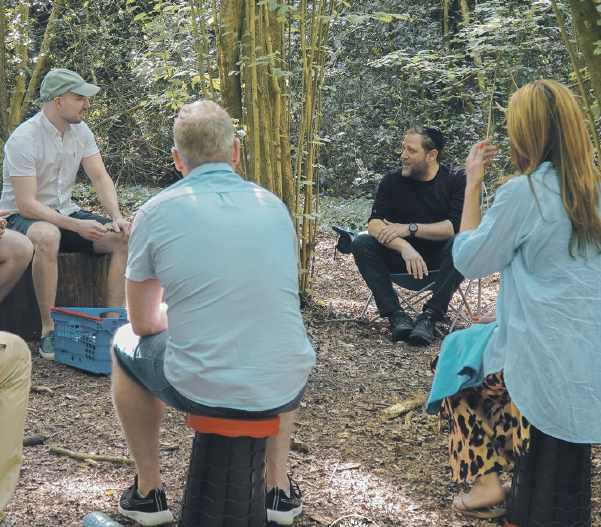
that the current events in Israel and the streets of the UK have exacerbated the feelings of stress, sadness and in many cases isolation, for so many of us in the community. This is all added onto the general burnout so many of us are experiencing due to technology, social media addiction and the cost of living beyond how we are physically, biologically and emotionally wired to live.
“Instead of taking selfies and experiencing the world through the glass screens of our phones, the experience of being with the trees, animals, flowers and plants of the woods all remind us that there is a natural rhythm and synchronicity to life that we have lost track of and that we so desperately need.”
• Soul Forest experiences has a session on Sunday 15 September at 4pm in Bigwood, and a preRosh Hashanah spiritual detox retreat on Sunday 29 September in Hertfordshire
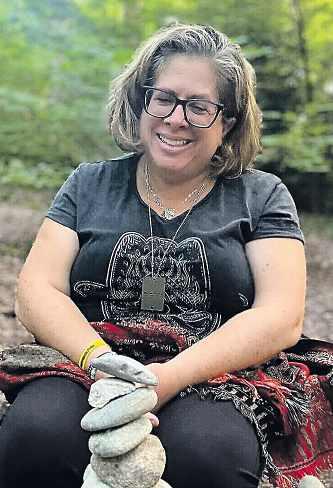




Within the grand, historic surroundings at Signature at Hendon Hall you will experience outstanding hospitality, ne dining and engaging resident-led activities alongside exceptional person-centred care.
We hold services every Friday with a local Rabbi, provide menus that are sensitive to our Jewish community’s needs, and celebrate all Jewish holidays with our residents.
To book your personal show round, please contact the Client Liaison Managers on 020 3131 3028 or email enquiries.hendon@signaturesl.co.uk
signature-care-homes.co.uk/hendon

Israel Guide Dogs PTSD service dogs are specially trained to bring an end to this nightmare. A nightmare that is being suffered by more Israelis than ever before since the events of 7th October and the subsequent war.







Please donate now to help us to train more of our superhero dogs so that, together, we can rebuild more shattered lives. 020 8090 3455























































Indirect and unintentional IDF gunfire likely killed Turkish-American activist Aysenur Ezgi Eygi, Israel acknowledged this week.
Eygi, 26, was killed in the West Bank last Friday during a protest in the Palestinian village of Beita against the nearby Israeli settlement outpost of Evyatar, which is on lands the Palestinian residents claim as their own. A resident of Seattle, she was protesting with the International Solidarity Movement, a group that has long demonstrated in Palestinian areas against Israel.
Dozens of mourners gathered at a funeral procession for Eygi at Rafidia Hospital in the West Bank
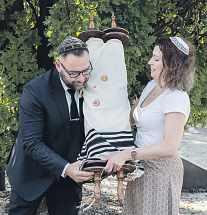
city of Nablus on Monday afternoon, where she was taken after she was shot.
The White House called for an investigation into her death, and the IDF said its troops had fired at another protester who was throwing stones at its soldiers.
The IDF said in a statement on Tuesday following an initial inquiry into Eygi’s death that gunfire is probably what killed her. The statement said an autopsy had been requested.
“The inquiry found that it is highly likely that she was hit indirectly and unintentionally by IDF fire which was not aimed at her, but aimed at the key instigator of the
riot,” the statement said. “The incident took place during a violent riot in which dozens of Palestinian suspects burned tires and hurled rocks toward security forces at the Beita Junction.”
The response added: “The IDF expresses its deepest regret over the death of Aysenur Ezgi Eygi.”
In a statement released on Saturday, Eygi’s family described her as a “fiercely passionate human rights activist” who protested “in solidarity with Palestinian civilians who continue to endure ongoing repression and violence”. The family called for an independent investigation into the circumstances of her death.

A Torah scroll was given its own seat on a flight to Lithuania to support a young Jewish community in Vilnius.
Following a request for help from the World Union for Progressive Judaism, the cherished Torah scroll set o on loan, accompanied by 24 members of Edgware & Hendon Reform (EHRS) and Mosaic Reform synagogues. The emotional handover took place
outside the Polin Museum, where Viljamas Zitkauskas, chair of the Vilnius Community, received the scroll in the presence of Andrew Keene, vice-chair of the World Union for Progressive Judaism, and Rabbi David Maxa, Progressive Rabbi of the Czech Republic and the convener of the Central European Beit Din.
Rabbi Tanya Sakhnovich, who led
the EHRS group, said: “It is such a privilege for our group to pass the Torah scroll to the chair of the Vilnius Jewish community.
“This scroll is not just a piece of parchment but a living reminder of our ancestors and the importance of our support and care for each other, regardless of the times that we are living through.”
A Pakistani man has been arrested in Quebec and accused of plotting to slaughter “as many Jewish people as possible” in New York City on or around the first anniversary of Hamas’ 7 October invasion of Israel.
A possible target was the Chabad-Lubavitch Hasidic movement’s Brooklyn headquarters, the man told investigators.
According to a Justice Department complaint Muhammad Shahzeb Khan, 20, who lives in Canada and is also known as Shahzeb Jadoon, tried to travel from Canada to New York City to carry out a mass shooting in support of Isis at a “Jewish centre” in Brooklyn.
Khan was arrested on 4 September and charged with “attempting to provide material support and resources to a designated foreign terrorist organisation, the Islamic State of Iraq and al-Sham (Isis),” according to a Justice Department press release.



Do you have a property to sell or let?
List it with us and we will take the stress out of finding a buyer or tenant
Why choose Squires?
Established in 2004, we advertise on all the major property portals including Rightmove and Zoopla and have 3 linked branches within North-West London.
Why choose me?
With 15 years experience I have a deep understanding of the local property market and living in Hendon means I have a wealth of useful contacts.
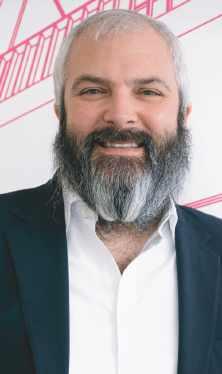
Editorial comment and letters to the editor
As we approach the anniversary of the devastating events of 7 October, the landscape of the Israeli-Palestinian conflict is undergoing a profound shift. This week, Israel’s Defence Minister Yoav Gallant declared that Hamas “no longer exists” as a military formation in Gaza. After 11 months of war, Gallant emphasised that while Hamas is still engaged in guerrilla warfare and its leadership remains a target, it is now shattered as an organised force.
This marks a significant turning point. For the first time in over two decades, Hamas no longer poses a serious threat to Israel. However, the question now arises: what will come next? As the conflict evolves from military confrontation to addressing Gaza’s future, it feels like the challenges are only just beginning.
David Lammy’s remarks in London on Tuesday underscore this uncertainty. the foreign secretary made it clear that “there can be no role for Hamas going forwards” in Gaza. The international community currently has no concept of what a post-Hamas Gaza might look like.
While this chapter of the conflict may finally be nearing its conclusion, the coming months – with the transition to reconstruction, humanitarian efforts, governance and long-term peacebuilding – promises to be equally challenging.
With Israel still engaged in fierce conflict in the north – it hit 30 Hezbollah targets in southern Lebanon on Tuesday evening – the broader pursuit of stability and peace for Israel and its citizens remains as elusive as ever.
8148 9693 alon@jewishnews.co.uk Sales
@jewishnews.co.uk
8148 9694
jewishnews.co.uk
020 8148 9701 marc@jewishnews.co.uk
020 8148 9709 beverley@jewishnews.co.uk
As one of foreign secretary David Lammy’s constituents, I was deeply disappointed by the government’s decision to partially ban arms exports to Israel. I’ve long supported Mr Lammy and appreciated his balanced political stance, but now it seems the Labour government might be putting party unity ahead of doing what is morally right.
This decision sends a troubling message to the UK’s ally, democratic Israel. While governments and leaders like Netanyahu come and go, the choice to make Israel less secure impacts all its citizens – whether Jews, Arabs, Armenians, right-
Limiting UK arms deals to Israel is sickening. Is this the same impressive David Lammy I met years ago at a Limmud conference in Warwickshire? This is a war started by Hamas. Israel is fighting for survival and an end to the suffering. Less arms doesn’t mean less tragedy – our brave soldiers, somebody’s
wingers, left-wingers, or centrists — and implies that at a time when Israel is still struggling for its survival against numerous barbaric foes (Hamas, Islamic Jihad, Hezbollah, the Houthis), the British government is opting to weaken it. This ban is likely to embolden Iran, where young people who aspire to democracy suffer under an extremist regime, as well as Iran’s proxy, Hezbollah. I find this decision particularly disturbing in light of the recent horrific murder in Gaza of six Israeli civilians.
David Frencel Hackney
sons and daughters are not to be fodder for any more fighting. Nearly a year since the beginning of hostage taking, loss of loved ones, the least ‘friends’ like the UK and America can do is supply more aid, not less.
Norma Neville Hendon
A BBC website headline last weekend reflects a disturbing pattern of anti-Israel bias. Hours after a report detailed 1,553 breaches of the BBC’s own guidelines on its coverage of Israel, the broadcaster released another misleading headline: “Three killed in attack at West Bank–Jordan border”. I assumed Israel had eliminated three terrorists, but reading the article itself I learned the victims were Israeli civilians. While I have long abandoned the hope the BBC might label such incidents as “terrorist attacks” or use appropriate language like “murdered”, basic journalistic ethics dictate that “Israelis” be mentioned in both the headline and subheadline. The BBC later amended the headline, but the
damage was already done.
This timing raises questions, especially given the BBC’s history of issuing corrections long after the initial misinformation has spread.
It’s part of a pattern where anti-Israel bias, intentional or not, distorts the facts and contributes to a false narrative. The BBC fails consistently in its responsibility to report accurately and fairly when it comes to Israel. Surely it is time for Ofcom to take serious action? With antisemitism at an all-time high in the UK and wordwide, the BBC must be held accountable for the bias it perpetuates.
Eli Cohen NW11
We at AJEX are seeking surviving family of 19751 Pte Hyman Levy, Berkshire Reg., killed in August 1916 and buried at Vermelles in Pas de Calais. He was the son of Jacob and Kate (nee Solomonick) from Russia; his siblings were Mary, Barnet and Philip and the family lived in Tarling Street in Whitechapel. Philip had two children, Barbara and Alan, born in the 1940s Will anyone who is a member of this family or knows them, please contact Martin Sugarman, AJEX archivist on martin.sugarman@yahoo.co.uk
Martin Sugarman, AJEX

Thank you for helping to make Jewish News the leading source of news and opinion for the UK Jewish community. Unlike other Jewish media, we do not charge for content. That won’t change. Because we are charity-owned and free, we rely on advertising to cover our costs. This vital lifeline, which has dropped in recent years, has fallen further due to coronavirus.
Today we’re asking for your invaluable help to continue putting our community first in everything we do. For as little as £5 a month you can help sustain the vital work we do in celebrating and standing up for Jewish life in Britain.
Jewish News holds our community together and keeps us connected. Like a synagogue, it’s where people turn to feel part of something bigger. It also proudly shows the rest of Britain the vibrancy and rich culture of modern Jewish life.
You can make a quick and easy one-off or monthly contribution of £5, £10, £20 or any other sum you’re comfortable with. 100% of your donation will help us continue celebrating our community, in all its dynamic diversity. Support Jewish News by visiting our donor page at jewishnews.co.uk


Every week I read pages and pages of articles about antisemitism and anti-Israel issues in the UK. Where are the good news stories? Do they exist? Should the community be packing up its bags and leaving now?
Geoff Abrahams, By email


















‘As there’s no more room in our prisons, we thought you could mind a couple of convicted felons while you’re on shul security’ “I




JOAN RYAN
EXECUTIVE DIRECTOR, ELNET UK
Nobody doubts our government’s sincere desire to see an end to the terrible conflict in Gaza. We all share it.
Sadly, its decision to stop some arms sales to Israel won’t help achieve that goal. Nor will it help hasten the end of the torment of the hostages and their families, or the su ering of thousands of other innocent Israeli and Palestinians caught up in the war – a war which was triggered by Hamas’ butchery on 7 October.
Given the size of Britain’s arms sales to Israel, the decision is a gesture. But it is a potentially damaging one nonetheless. It will direct attention away from those states which need to apply maximum pressure on Hamas to accept the ceasefire deal proposed by Israel and endorsed by the UN Security Council in June – states such as Qatar and Turkey, which physically and financially host the terror group.




It will be read by the Iranian regime – a regime which is fighting the Jewish state on seven fronts – as a weakening of Britain’s commitment to Israel’s security.
And it will send a signal that Britain believes Israel is breaking international humanitarian law – a judgment that no international court has rendered and one which flies in the face of a mountain of evidence that Israel is doing no such thing.
There are three steps our government can take which will help restore trust and underline to Israel that, as John Healey, the defence secretary, argued, the UK’s commitment to its security remains “unshakeable”.
First, since Hezbollah opened a second front on 8 October, there have been nearly 2,900 attacks – including rockets, missiles and suicide drones – launched at northern Israel. Over 60,000 Israelis have been evacuated from their homes and 47 people, including 25 civilians, have been killed.
Hezbollah’s presence in southern Lebanon is a clear and continuing breach of UN Security Council resolution 1701 which ended the 2006 war. In reality, both the
Lebanese Armed Forces and United Nations Interim Force have proved unable or unwilling to confront Hezbollah and enforce the terms of the UN resolutions which require its forces to remain some 17 miles north of the Blue Line.
The US and France have, for understandable reasons, taken the lead in e orts to promote de-escalation but Britain’s voice should be heard too: after all, since 2009, we’ve invested £100m in the Lebanese army and helped train over 26,000 of its troops.
The government is right to call for de-escalation, but it is important that the British public also receives a clear message: it is Hezbollah, an Iranian-backed terror group proscribed in the UK, which is breaking UN resolutions and is directly responsible for the bloodshed in both Israel and Lebanon. Moreover, our diplomatic e orts should focus on a simple truth: the fastest route to de-escalation is full international enforcement of UNSCR 1701.
Second, the government in July launched a strategic defence review which will report in the first half of next year. Its parameters
include examining how to maintain the UK’s defence ties to the Gulf and the Middle East. It is vital tackling the threat posed by Iran is at the centre of this element of the review.
Most importantly, we need to stop viewing Iran simply in terms of its threat to Israel and our interests in the region – very real though they are.
Iran’s missiles have a range capable of reaching Nato states such as Romania, Bulgaria and Greece. Tehran and Moscow are currently finalising a new comprehensive partnership agreement. And, of course, the regime has become Russia’s closest ally in Vladimir Putin’s war against Ukraine –supplying suicide drones and reportedly now preparing to send ballistic missiles. Finally, and relatedly, the government last week announced it was sanctioning four new IRGC targets. This is welcome news, and it should be swiftly followed by action to fulfil its pledge to proscribe the Islamic Revolutionary Guard Corps.
Israel and Britain share a common coalition of threats and foes. We’re stronger when we work together to counter them.






JEREMY HAVARDI HISTORIAN & JOURNALIST
Right now, Israel is a deeply fractured country with increasing numbers demanding an end to the war and a deal to free all the hostages. With as many as 500,000 people lining the streets of Tel Aviv recently, the atmosphere is febrile and the anger is palpable.
Such are the depths of grief and cynicism towards the political establishment, that many have blamed the murder of six hostages directly on Netanyahu and his alleged vacillation preceding their deaths.
The concept of pidyon shvuyim, the rescue of captives, is core to Israeli self-identity and a mission of the utmost value in Judaism. And that is why one of the war’s key goals is to ensure the safe return of the Israelis seized on 7 October.
But a premature deal with Hamas to end the war would be a tragic and terrible mistake from which Israel might take years to recover.
To understand why, it helps to think from a Hamas perspective. Yahya Sinwar knows that he can exert enormous leverage from the remaining hostages he holds.
He will surely use them to exact the maximum concessions from Israel in the coming months, demanding that the IDF withdraw from the strategically vital Philadelphi corridor, leave Gaza fully and then end the war.
In addition, Israel will be forced to hand over many hundreds of terrorists from its jails as part of an Iranian strategy to ignite the West Bank with terror. Until Israel agrees to these conditions, it is hard to see why Hamas would give up its main bargaining chip in these negotiations.
With Hamas in charge of the Philadelphi corridor, it can continue to smuggle quantities of weapons via the Egyptian border and re-assert its control of Gaza.
It is only a matter of time before rockets start being fired again and the next terror attacks are launched against Israeli civilians with terrible and deadly consequences for both sides.
Some argue that the withdrawal from Gaza can be merely temporary. Israel, so it is argued, has to merely leave Gaza for six weeks and can always return when Hamas breaks its side of any agreement, as it surely will.
But this is to assume that Israel will face no international pressure if it re-enters the enclave.
Right now, the US and her allies are desperate to bring the war to an end, with all wanting a process of negotiation that does not involve a resumption of hostilities.
Similar pressure is building up inside Israel among an increasingly war-weary public. Hamas’ leaders know this too and will surely increase their demands in return for releasing all the hostages.
A hostage negotiation to end the war sends out the wrong message to the terrorists. It suggests that taking captives yields long term political dividends, encouraging them to continue this egregious practice.
It tells the Israeli families of terror victims that they will not receive justice in the long term, that, regardless of the crimes committed against their families, the perpe-



trators will soon be released, doubtless to commit further atrocities.
It cannot be forgotten that one of those terrorists released in 2011 as part of the Shalit deal was Yahya Sinwar, architect of the 7 October massacre. Then as now, there was a deep clamour for a hostage deal, seemingly at any price. It was a tragic mistake then and it is a tragic mistake now.
That is not to say that Israel should abandon the hostages; far from it. Their desperate plight should be front and centre of Israel’s Gaza strategy.
Israel should continue applying intense military pressure until either the hostages are found or until a much-weakened Hamas is forced to release them. The US should also continue to pressure Qatar, one of the Islamist group’s main backers.
It is often said that those who seek the defeat of Hamas are pursuing a war without end. Actually, it is those who want ‘deals’ with a genocidal death cult, one which seeks to revive and rebuild so it can attack Israel all over again, that are creating the recipe for endless war.








CO-FOUNDER OF NAHAMU & TRUSTEE OF THE JEWISH ORTHODOX FEMINIST ALLIANCE UK
Igrew up in Glasgow. As a teenager I met Charedi girls my age. On Sunday mornings, we would learn Chumash with Rashi, sitting around the teacher’s dining table. I attended school during the week and I was aware I was obtaining a wonderful secular education, which would lead to recognised qualifications. The other girls attended an unregistered school. Their classroom was the windowless shul cloakroom where I hung my coat each Shabbat. I left school to attend university, whereas some of them graduated into early marriage and motherhood.
At my Shabbat table nowadays, I often host men and women who attended unregistered schools or who have their children in unregistered schools.
Their lack of secular education has placed many limitations on their lives.
Some of those who have later pursued education have been shunned by their

families. Some attended registered schools, but their attainment was so poor the di erence is barely discernible. Most shocking are the women I meet who have attended registered schools and achieved exceptional GCSE results but have been prevented from accessing tertiary education.
I’ve been an activist in this area for more than 10 years. In this time have co-founded Nahamu and put this issue on successive government’s agendas.
I’m also conscious that my own children have attended two fantastic Jewish secondary schools. As a Jewish community in London, we have invested in secondary schools with amazing facilities. But nearly 10 years after David Cameron, then prime minister, promised to shut down the unregistered schools, Chasidic boys are still being denied secular education, leaving many functionally illiterate and innumerate.
Universal full-time yeshiva education is a recent innovation. In previous generations, for reasons of economic necessity, boys were taught a trade alongside their yeshiva studies.
This approach is based on the teachings of the Talmud: “Rabbi Yehuda says: Any father who does not teach his son a trade teaches
him theft. The Talmud expresses surprise at this statement: Can it enter your mind that he actually teaches him to steal? Rather, the verse means that it is as though he teaches him theft. Since the son has no profession with which to support himself, he is likely to turn to theft for a livelihood.”
In modern Britain, a combination of welfare state provision and support from philanthropic donations has meant that the Charedi community has been able to facilitate full-time Torah study, although this has resulted in a cash-in-hand economy to preserve benefit entitlement.
I see the denial of education as a human rights issue. The denial of the right to educa-
tion of an entire cohort of Chasidic boys and the stymieing of girls’ attainment for the sake of ensuring early marriage.
Government agencies have turned a blind eye; the rest of the Jewish community are quick to say “its normal for them”, a soft bigotry of low expectations.
I’ve written a policy paper setting out the gaps and loopholes which are facilitating the denial of education, based on many conversations and interviews with those who did not receive the education I did.
I write with the knowledge of the impact of the denial of secular education, with the broader Jewish commitment of tikkun olam (making the world a better place) and with a firm acceptance of the commandment aniye ircha kodmim, which requires us to address deprivation within our own community before attempting to address it elsewhere.
Some people will be worried that this report will attract antisemitism.
I am also concerned about antisemitism –and that is why I believe it is more important than ever that our community is resilient and sustainable.
What that means is we need to educate all our children – including Charedim.
JON MEDVED
FOUNDER & CEO OF OURCROWD
The resilience of Israeli tech, and the growing investment in it from abroad, have significant implications for Israel’s fundamental economic stability. What was the fastest-growing venture economy in the world in the first half of this year?
Let me surprise you. It was Israel.
Venture funding in Israeli startups grew by 31 percent in the first half of 2024 compared to the last half of 2023 – almost double the global rate of 16 percent. This surge occurred even as war raged with Hamas and Hezbollah, and Israel came under direct attack from Iran for the first time in history.
Israel outstripped the US, the next-fastest growing region with 28 percent, while venture investment in Europe and Asia declined, by six percent and 18 percent respectively.
“Israel’s tech ecosystem demonstrated remarkable resilience in the first half of 2024, with significant growth in funding and M&A activity,” says Eze Vidra, co-founder and
managing partner at Remagine Ventures and a veteran observer of Israel’s tech sector.
No, this was not a case of Israeli institutions propping up the local economy. Foreign investors account for 46 percent of the 217 active venture funders in Israel. They participated in 93 percent of all funding, a seven-year high and a resounding vote of confidence by the global financial community in Israel’s innovation ecosystem even as the rockets were flying.
The big names voted with their cheque books. Index Ventures has invested $60m in five Israeli startups since the start of the war, while Sequoia and Greylock reopened their Israeli o ces and Accel raised a $650m fund in May to invest in Israeli and European startups. “Raising an eighth fund to invest in Israel is no longer a brave decision; it doesn’t matter what the situation is here,” Accel partner Harry Nelis told Calcalist. “Israel has always been one of our key markets, and we hope it will continue that way.”
Don’t get me wrong. The months since the barbaric Hamas attack last October have been painful and hard. Just within OurCrowd, two colleagues have lost family members, another was kidnapped and is still missing in Gaza,
and two other family members were critically wounded and face months of rehabilitation.
At any time, up to about 10 percent of our employees are serving in the reserves. Last month we su ered the body blow of hearing that Hersh Golberg-Polin, son of Jon Polin, a founder of our early portfolio company Abe’s Market, was murdered by Hamas after being held captive for more than 300 days.
Startups across the country have to contend with employees being called up for military reserve duty and their children terrified by Hamas and Hezbollah rocket attacks, while companies located near Gaza or near Lebanon have been displaced.
Still, Israeli startups have remained largely resilient, and the country’s world-beating rise in venture funding despite ongoing security challenges indicate their resilience is gaining admiration and support around the globe.
Israel’s economy is certainly under pressure. Uncertainty over security and flight schedules has played havoc with the tourism industry and with the import and export of goods carried by plane. Agriculture and construction have been hit by a ban on most Palestinian workers entering the country, and
an understandable unwillingness of other foreign labourers to come.
High tech contributes 53 percent of Israel’s exports, 20 percent of its GDP, and 24 percent of its tax revenue
As the Israel Innovation Authority points out, Israel’s foreign earnings no longer depend on Ja a oranges or tourism.
Israel is not just a modern economy, it is one of the most high-tech economies in the world, with an outsized concentration on its innovation ecosystem.
I believe the increase in Israeli venture funding will continue, because the country’s tech ecosystem is uniquely positioned to benefit from four current growth trends in the global venture economy – mega rounds, cybersecurity, artificial intelligence and defence.
So the venture data is in and, to everyone’s surprise, Israel is outperforming the entire world despite what is happening here.
If this happening now, just imagine the boost to Israel’s tech sector and to its broader economy as soon as this war ends, with Israel’s security and deterrence restored.
We must all hope and work to make sure this happens as soon as possible.
A Live Presentation from Israel
Wednesday 25th S eptember 2024
3-5pm
Venue: North-West London
Price: £15 per person
RSVP: 020 8732 6101 or email kklevents@kkl.org.uk























































Boost
Discover


“I
Increase
Manage




















Edgware and Hendon Reform members celebrated the Jewish New Year for Animals with a ‘Bark Mitzvah’ with 15 dogs, owner families and 35 animal lovers taking part. The service included blessings for the gift of pets, appreciation for their companionship during these difficult times and even a prayer of remembrance for departed pets.
Jewish Futures has inaugurated a new centre, The Hub, in north-west London’s Jewish community, complementing its Hendon Central headquarters. The three-storey building now serves as a space for GIFT’s warehouse and volunteering activities, the newly forming young community Kehal Yedidim, and a young leadership centre and social lounge.
Sacks Morasha families have been nurturing an allotment in Finchley for more than two years and this summer’s harvest was one of the most rewarding yet. Children dug potatoes, picked beans and collected wild blackberries, with the allotment having become a thriving hub for the community, offering not just fresh produce but also an opportunity for families to connect with nature.
Nearly 200 people, including religious and civic leaders, witnessed the dedication of the new home of Mosaic Jewish Community in Stanmore. The building houses Mosaic Reform, Masorti and Liberal Synagogues, the three constituent parts of the community. Guests included the leaders of the Reform and Masorti movements, Rabbi Josh Levy and Rabbi Jonathan Wittenberg, the Bishop of Willesden, plus the mayor of Harrow,. With space for each synagogue to hold concurrent services, and a religion school, there is also a hub with a children’s soft play area and café.

Two young brothers from Nancy Reuben Primary School raised £531 for United Hatzalah of Israel with a bake sale. Eli (8) and Avi (6) Braham spent three hours outside Kosher Kingdom on a Sunday afternoon and were thrilled to have more than tripled the amount they raised last year by £162. Later that evening, the boys delivered some of their baked goods to the children of Great Ormond Street Hospital. Well done!
Young-at-heart Monty Goldstein celebrated his 100th birthday at a party with family members and friends including members, volunteers and staff at Jewish Care’s Redbridge Jewish Community Centre. Monty’s son created an amazing photo collage about his life, and the team at the community centre created a quiz about him, working out all the right answers with Monty’s support. They also baked amazing cupcakes with a personalised Monty topper. Dancing to the entertainment with Rhoda, his wife of 30 years, was a magical way to round off a special day.













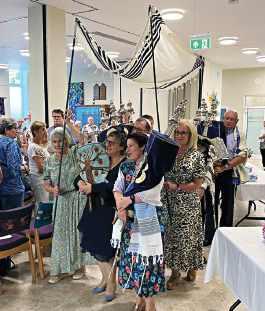










Jewish News presents
Wedding and bar/batmitzvah show
Sunday 3 November 2024

DoubleTree by Hilton London Elstree WD6 5PU Show sponsors 11am - 4pm



An interactive digital memory map brings the history of the UK’s first Jewish club to life. By Debbie Collins
Oggie oggie oggie!” [Can I get a...] “Oi! Oi! Oi!”
Most of us of a certain age were members of a club at some point and nostalgia washes over us when reminiscing about the songs, activities and (long-lost) friendships. One such club with a rich history is The Brady Club, established in 1896 to serve London’s East End community, o ering underprivileged children opportunities for personal growth, social interaction and education.
The name was taken from the original site at the junction of Brady Street and Durward Street, where dwellings were built by the Rothschilds to accommodate Jewish immigrants. Driven by Lady Rothschild, this lifeline project aimed to improve the social quality of life of the ‘working poor’ – young men, in reality just kids of 14 who had left school and headed into the workforce, most of them from East European refugee families, speaking only Yiddish.
By 1925, the girls yearned for a club of their own and Elsie Cohen (later Lady Janner) established the Brady Girls’ Club in Hanbury Street (now known as the Brady Arts & Community Centre.)
The Brady legacy lives on today through the work of past members and a passionate trio: Susan Andrews, Anne Percival and Paul Brent, who form the Brady Photo-
graphic Archive team and together developed the bradyarchive.co.uk website and the newly-launched interactive memory map, a visually stimulating digital map which facilitates a ‘highlights version’ of the best bits. This unique digital journey takes you through the history of Brady, with club members giving a bitesize insight into their lives in three-minute videos, including visits to Skeet Hill House, a Kent retreat bought in 1944 by Brady.
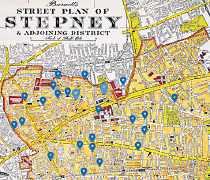
Susan, a photographer and film-maker (and emerita professor of photography at London Metropolitan University) who has been busily scanning and recording for the past three years, says: “As word spreads, the network of people we’ve interviewed has grown, with almost 70 ‘flags’ on the map, which you can click to reveal videos about East End life and how Brady started out as somewhere to eat, get some clothes or get your homework done, but quickly became more activityfocused and more of a social space. The memory map is set up to receive more stories in the future with plans to help it grow.”
Everyone wanted ‘in’ at Brady and as the demand grew, di erent age groups were catered for, not just

The Jews of Oporto Holocaust diary
Laurence Geller


the working poor demographic who were around 14.
Whether a minor going after school for a jammy dodger or a senior attending dances, the West End Jews managing the club made it available to everyone but there was a cost involved: six old pence; unaffordable to many. Former member Yvonne Brent says: “People were very generous and nobody knew who did or didn’t pay the fee. It was completely non-discriminatory and no one missed out.”
West End Jews such as Joyce Kemble (of Kemble Pianos) were committed to making sure everyone was welcome and given opportunities, such as a quiet space for homework if things were a little crowded at home. And Frank Austin (Worshipful Company of Furniture Makers) had a box at the opera and took kids along who had never been exposed to classical music.
recalls one such story of taking
Many of the stories highlight Paul ‘Yogi’ Mayer who came to Brady as a leader in 1951. With no risk assessment or consent form in sight, Susan recalls one such story of taking a group abroad. “Wearing just their plimsolls to climb mountains, Yogi instructed the boys to ‘hitchhike as far as you can for two days and come back with stamped tickets as proof of where you got to’. It gave them confidence and freedom, coming from such a life-limiting background.”


Particularly heartwarming are the double acts, arguing in jest their version of stories from their Brady days. Mike Yershon and Brian Gevelb certainly need their own TV show. Or at least a podcast. Not forgetting those who overcame real struggles, certainly in the case of Michael Lazarus, who developed a stammer when a bomb went o . His impediment meant di culties at school and through Brady he regained his self-confidence. A BBC producer visited the club looking for people to present a debate show - Michael got through to the audition and went onto Cambridge, eventually winning a BBC award for speaking.
From the East End to north west London, Paul Brent, chairman of The Bradians Trust and a former Brady member (who met his wife Yvonne there) explains the Brady Maccabi collaboration. “Many Jews moved to North London and Maccabi had already established itself in sports, so it was felt like a good idea to bring the two together. It ran for a few years but it was felt to be less successful – the East End really needed it, whereas
at Maccabi as everyone was from di erent backgrounds.”
Susan recalls an activity they ran for Stoke Newington School for a group of 30 students aged 14. “We Are The Brady Girls was running as an exhibition last October at London Metropolitan University and we held our activity there.
Being so soon after the events of 7 October in Israel, there were security concerns and the question of how well it would be received but there was no trouble at all. Anna says: “One of the old Bradians turned up by chance and spoke to the kids, which was a wonderful addition. They were split into groups and given old photocards of club activities from the 1940s and they wrote their own messages on postcards, which we hung in the installation. When they regrouped, they were in such positive and empowered mood saying, ‘I wish we had a club like Brady.’”


memory map will ensure that
the wider community as well.
Funded by the local authority, the Brady Centre still exists for the community – an amazing resource for the locals, albeit in a di erent form. And with such a rich history in the area, there’s no doubt that the archive work and that of the memory map will ensure that the memories live on, not just for the old Bradians but for the wider community as well.
Visit bradyarchive. co.uk for more information
• Explore more stories at bradymemorymap. co.uk
The diary of a teenager in Lithuania’s Vilna Ghetto is now available to a global audience through an online exhibition, writes Jenni Frazer
Eighty years ago, in July 1944, Vilnius, the capital city of Lithuania, was liberated from its Nazi occupation by the Soviet army.
Sore (Sarah) Voloshin was the sole survivor of her 50-strong family. Sore had fled mass Nazi shootings in the Ponar pits, just outside Vilnius, and joined the partisans in the surrounding forests.
After liberation the teenager, together with her friend Feyge, climbed back into the attic of a house in Dysnos Street in Vilnius, where her family had been hiding before being rounded up in September 1943. And there on the floor was the 200-page diary of her brilliant cousin Yitskhok Rudashevski, who had been murdered in Ponar.
Sore scooped up the diary, written in Yiddish, together with what family photographs she could salvage and gave it to the writer Abraham Sutzkever, who briefly displayed it in a post-war museum of Jewish artefacts, before realising that it and other Jewish Holocaust material were unlikely to survive the Soviet rule in Lithuania.
The diary – and thousands of pieces of written material – was sent to the YIVO Institute for Jewish Research in New York, where it remains. On 17 July Yitskhok’s diary of the Holocaust, as experienced in the Vilna Ghetto, came triumphantly to life. YIVO commissioned a new English translation, and the diary is the focus of an online exhibition, free to a global audience.
Arguably the most famous Holocaust diary is that of another teenager, Anne Frank. But Anne, just two years younger than Yitskhok, was able only to write about life in the annexe in Amsterdam where she and her family, together with other Jews, were hiding from the Nazis. Yitskhok chronicled living conditions in the Vilna Ghetto and his thoughts about his family, his school, his friends and his keen sense of political developments as the Nazis swept across Europe.
Tog, a Jewish daily paper, and his wife Rosa, a seamstress. The family –including Yitskhok’s maternal grandmother – lived in a flat in the city.
We learn from the exhibition that Yitskhok was a clever and involved school student, and that “Plenty of Jews in Vilna were religious; Yitskhok Rudashevski was just not one of them. However, his family still considered itself culturally Jewish”.
Yitskhok and his cousin Sore often walked to school together, discussing their mutual love of Yiddish writers. He is described as “a committed young Marxist”, who took great interest in world politics. His father told him about stories he was working on at the newspaper, and Yitskhok read books and articles to help him stay informed. He heard news about what the Nazis were doing in Germany, and worried that soon their actions would impact his family and his community.

gun. Unfortunately, I have spotted the first soldier of the German army of occupation. His helmet flashes evil and cold.”
The day after this diary entry, the Nazis began imposing martial law in Vilnius, and local Lithuanians and police agreed to help them.
The first diary entry was on 14 June 1941, when he was 13, though he may have started recording his thoughts earlier. But on that day, he wrote: “I observe the empty, sad streets. A Lithuanian with a gun is standing in the street. I begin to grasp the vile treason of the Lithuanians: they shot the Red Army men in the back. They are going along with the Nazi bandits. The Red Army will return, and you will pay dearly, traitor! We will outlive you – that is our answer to the Lithuanian soldier with the Haenel gun.
The YIVO curator of the exhibition, Karolina Ziulkoski, says Yitskhok wrote about what happened between June and December 1941 in retrospect. “Then there is a gap, and he began writing again from September 1942 until April 1943” – though he and his family were probably not killed until September or October 1943.
Yitskhok recorded: “Weeks go by. I am cut off from the summer, from my surroundings, chained to the house, to the courtyard. I don’t see any of my friends. There is no contact at all among the group. Everyone is preoccupied with his own day-to-day worries. Jews are humiliated and exploited. We have to stand in long lines to obtain bread and other foodstuffs. Jews are pushed out of them. Germans come up to the queues and throw the Jews out. Jews receive less food than the Aryans. Our life is a life of helpless fear. Our day is without a future.”
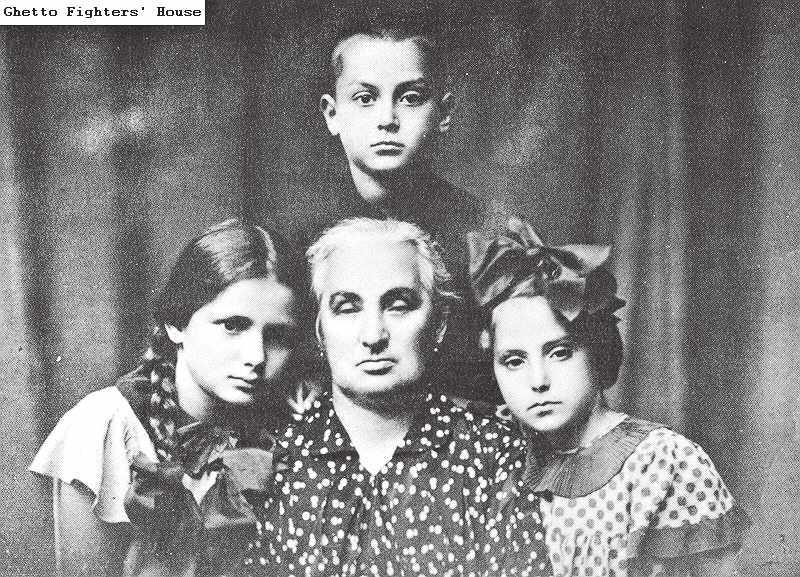
When Yitskhok was born on 10 December 1927, Vilna was part of Poland. He was the only child of Eliyahu, a typesetter for the Vilner
The path of the diary over time and Jewish partisans in the forests of Lithuania.
USHMM and the YIVO Institute
time, I couldn’t put on the patches. It felt like a hump and two frogs were on me. I felt ashamed to appear with them in the street, not because I am a Jew, but because I am ashamed of what has been done to us. I was ashamed of our helplessness… they will hang patches on

cleared of inhabitants. Hundreds of people, wrote Yitskhok, were taken to Ponar. “Ponar — that word is written in blood. Ponar — the huge grave... a slaughterhouse for thousands of Jews. The Ponar area is saturated with Jewish blood. Ponar is the same thing as a nightmare, a nightmare that has accompanied the gray thread of our ghetto-days. Ponar is passive death. The word contains the tragedy of our helplessness. No! We will not go to Ponar.”
The Nazi grip on the Jews of Vilnius becomes tighter and tighter, with new draconian restrictions announced daily.
Yitskhok wrote: “It is dawn. I look out of the window and I see the first Vilna Jews with patches. It pained me to see how people are staring at them. The big pieces of yellow material on their packs burn inside me. For a long
us from head to toe, and we can do nothing about it. It pained me that I could see no way out.”
On 6 September 1941 the Vilna Jews were herded into a ghetto, a few tiny streets crammed with people. “I locate my parents and here we are, in our ghetto home. It is evening, very dark and rainy. The little streets Rudnitsker, Shavler, Yatkever, Shpitol [Hospital] Street, and Disner, which make up the ghetto, look like anthills. They teem with people”.
Because the Nazis kept changing the rules about valid documentation, the Rudashevski family was eventually forced to go into one of the hideouts set up by the ghetto inhabitants — the so-called melinas The family secreted itself in cramped conditions between two floors of a flat as the ghetto was
Tragically, however, Ponar was indeed Yitskhok’s fate. His last diary entry was on 7 April 1943 and his cousin Sore later said he spent his last months “quiet and depressed, not writing and barely speaking”. In September the family, fearful of being caught in another aktion, or round-up, hid in another melina, this time in the attic of Dysnos Street, where they hoped to hole up until the Soviet army came to liberate Vilnius. They survived for 11 days in the attic until a person sent out for water was followed by the Nazis, the melina was discovered, and everyone was sent to prison. Days later Eliyahu, Rosa and 16-year-old Yitskhok were taken to Ponar and shot dead.
YIVO says the teenager’s diary provides “intimate insights into daily life, cultural resistance, and moral choices faced by those in the ghetto. The exhibition also ties into broader themes of preserving heritage and the importance of youth voices in historical narratives.”
Yitskhok Rudashevski: A Teenager’s Account of Life and Death in the Vilna Ghetto is available at museum.yivo.org

























More than 500 years after their expulsion, the Jews of Portugal’s second city are staging a renaissance. Michelle Rosenberg goes to meet them
Five hundred years ago, the Jews of Portugal were expelled. Their roots in Lisbon, Oporto, the Algarve and the mountains of Belmonte, reaching back thousands of years, were wiped from history.
Today the community of Oporto (Porto), the second largest city in Portugal, comprises more than 1,000 Jews from 30 countries. It has flourished and revitalised over the past decade after nearly a century of sleep.
I was invited to visit the small group of board members whose sole purpose is re-establishing a community, albeit quietly, cautiously and, in many ways, secretly, often remaining anonymous for their own safety.
Their caution is understandable – a brief look at the tumultuous history of the country offers a glimpse of the horrors its Jews have faced, making its current determined expansion even more extraordinary.
At the end of the 15th century, the community in Portugal took in tens of thousands of Jews who had been expelled from Castile due to the Spanish Inquisition. By royal decree they were forced to wear a six-pointed star on their clothes. Despite their huge contributions to the country’s economy and culture, it wasn’t long before the prejudice and culture of intolerance from Spain spilled over into Portugal.
In 1496, Manuel I of Portugal issued an Edict of Expulsion of the Jews. Their choices were to leave or convert to Catholicism and become ‘new’ Christians. Those who couldn’t afford to leave stayed, keeping their faith in secret, with thousands becoming marranos (‘pigs’) or crypto-Jews.
They were still subject to punishments for heresy, including being burnt at the stake. The Portuguese Inquisition was only disbanded in 1821.
Then there is the case of the so-called Portuguese Dreyfus: Captain Artur Carlos de Barros Basto. Born into a Christian family in 1887, his grandfather had held to his Jewish roots. Basto converted to Judaism before a rabbinical court in Morocco and made it his life’s work to re-establish a Jewish community, which then numbered only eight families.
He was instrumental in the building of the Kadoorie Mekor Haim Synagogue, founded in 1923 and completed in 1938, financially supported by a wealthy Jewish family from Hong Kong.
The largest synagogue in the country, it later provided shelter for some 5,000 Jewish refugees who arrived in Oporto between 1939 and 1940, seeking a temporary home after fleeing Nazi persecution in Europe, before emigrating to countries including Canada, the USA, Venezuela, Haiti and the UK. None wanted to stay in Portugal; none wanted anything more to do with Europe.
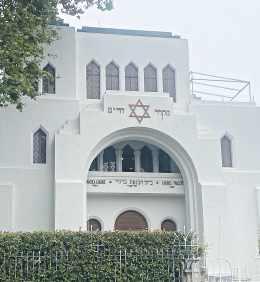


After the war, there were hardly any Jews left in Portugal. Emigration and assimilation played their part, and an anonymous letter sent to Basto, accusing him of homosexuality, destroyed his military career. His actions in circumcising some of those crypto-Jews were deemed immoral by the army.
He died in March 1961; in a twist of fate, his economist granddaughter Isabel Lope Basto is now treasurer of the Oporto Jewish community. Following the political upheaval of revolution in Portugal in 1974, about half of the country’s Jewish population emigrated to Israel, Brazil, Canada and the USA.

are proud that “in 10 years, the community has not only been reborn, but has experienced exponential growth”, the revival has not been welcomed by all. In in 2022 the community’s rabbi was arrested and humiliated while an “unexpected search” was conducted at its buildings, including the Kadoorie Mekor Haim synagogue.
Senderowicz claims that the Oporto Jews were victims of a “very serious case of antisemitism perpetrated by a collusion between state agents, police, journalists and anonymous whistleblowers”.
It is against this backdrop that Jewish News was invited to meet the small group spearheading ambitious attempts to revive the community. We meet in the gallery room of the synagogue, surrounded by artworks depicting the history of Oporto’s Jews and are welcomed with a large bottle of traditional port.
Gabriel Senderowicz, president of the Jewish community, says: “Ten years ago there was nothing here and today there is everything.”
Buoying the return of the Jews was the 2015 passing of a law allowing descendants of Sephardic Jews who were expelled in 1492 to apply for Portuguese citizenship.
Oporto now has a full synagogue, a consecutive minyan for eight years, two museums, kosher restaurants, a kosher hotel, a mikveh, internationally-awarded history films and a cemetery founded in April 2023 - the first Jewish cemetery in Oporto in 500 years, the previous one destroyed during the Inquisition. Its only engraved stone is one movingly dedicated to those murdered on October 7. Otherwise, it remains empty, awaiting the first Jewish body in centuries to be buried on consecrated ground.
The community built a second synagogue for a largely French student community and helped build the largest Chabad Centre in Europe.
Interfaith plays a strong part in their ongoing work, with Senderowicz describing the Bishop of Porto as “the best friend the community has in Portugal”.
While Senderowicz notes that they
David Garrett, a criminal lawyer whose family’s history in Portugal goes back at least 200 years, is doing his utmost to close any loopholes that could prevent the community from surviving. Thus the community filed a petition with the European Court of Human Rights in Strasbourg against the Portuguese government, claiming “brutal actions” against it as well as damage to its reputation, calling it “21st-century blood libel”. It claimed that “millions of documents and private correspondence relating to the community and its members were taken from the community’s institutions, just as the Inquisition did when it framed members of the Jewish community and invaded their homes and workplaces, based on anonymous complaints”.
This year, more than 1,000 people visited the synagogue, where an epigraph dedicates the assets of the Jewish community in Porto to the Jewish Agency, to be used if the Jewish community in Porto ceases to exist.
The ceremony took place in a room documenting the rise of antisemitism in Portugal over the past decade. There is, however, hope, optimism and determination. The Jewish and Catholic communities of Oporto have signed a friendship and co-operation protocol agreeing to work together on joint charitable projects. Challahs are baked and sold from the synagogue; kosher food at Hotel da Música is served in foil packaging at three tables in a quiet corner and Gabriel tells us that he walks the streets freely wearing his kippah. Services are busy, families are growing and the community is determined to thrive.
Most importantly, it is determined this time to survive.







This unique event provides doctors and medical students with the opportunity to meet with representatives from across the Israeli medical establishment.
We’re excited to welcome keynote speaker

Ichilov After October 7: Challenges, Impact & Growth
MedEx is the only place where you can:
• Have your documents certified in person








• Begin the process of transferring your medical license


• Interview with Israeli hospitals and medical clinics


*Children's activities will be held during the event






• Discuss your Aliyah plans even if they’re long term








Laurence Geller is building a chain of luxury homes for people with dementia and gives 75% of his wealth to good causes. By Candice Krieger
hat do Sir Winston Churchill and Israeli entrepreneurs have in common?
WLaurence Geller can explain. The businessman believes that they share a can-do attitude and distinct curiosity, traits that Geller – one of the world’s most recognised hoteliers – tries to apply in both business and life.

Laurence Geller
Starting out in the hospitality industry, he climbed the ranks of five-star hotels in London and Europe before moving to the United States, where he grew brands like Holiday Inn and Hyatt. As the founder and CEO of Strategic Hotels & Resorts, Geller curated and managed a prestigious portfolio of luxury properties across North America and Europe, including Four Seasons and Ritz-Carlton.

But it was his time in Israel volunteering in the Israeli Defense Forces age 19 that really stands out.
“This is what changed my life,”
Geller, 77, tells Jewish News . “In England, you say ‘Why?’ In Israel, you say ‘Why not?’ This can-do societal attitude taught me about ambition and gave me the confidence to have the chutzpah to believe in myself - that’s everything.”
And as for Churchill, Geller’s interest in the wartime leader began in the 1980s when he read the Martin Gilbert biography, all 10 million words of it. “I admired his spirit and curiosity and drew parallels between his resilience and leadership qualities and the Israeli ‘can-do’ attitude – they taught me invaluable lessons for the future.”
Geller became deeply involved with the

Full Time
Flexible & Hybrid
33½ hrs/week
c£80,000 - £90,000 p.a.
These are exciting and historic times as our two organisations embark on a journey together to create a stronger unified Progressive Judaism for the UK
The Job:
To be responsible for all Finance and Risk Management
To be hands on and in liaison with the finance team, deliver management and financial accounts for 5 organisations (totalling £10m t/o)
To be proactive in identifying risk for events, camps and tours, minimising exposure
You are:
A qualified accountant (ACA, ACCA, CIMA) ideally with not-for-profit experience
Experienced in multi-tasking dealing with a number of different stakeholders
Proactive and prepared to be hands-on at all times
Experienced at financial analysis and management
Flexible to meet the needs of the job
An excellent communicator, able to participate and present at Board meetings
Committed to fairness, equality and diversity with high standards of integrity, honesty and self-discipline
Excited to be part of our new journey, committed to working hard
For a full recruitment pack and application details go to: https://www.reformjudaism.org.uk/director-of-finance/ or contact gshulman@rjuk.org
Deadline: 9am on Monday 30th September 2024
International Churchill Society, where he eventually became Chairman in 2003 and incidentally through which he met his second wife, Jennie, Churchill’s great-granddaughter. The couple married in 2022.
Geller is the largest donor to the International Churchill Society and in 2015, he donated $1m in 2015 to make Churchill’s papers available to schoolchildren throughout the world accompanied by tailored learning modules.
Philanthropy is a huge part of Geller’s lifehe gives away around 75 percent of his money to a variety of causes (more on this later).
The affable businessman continues to embody Churchill’s steadfast resolve and the Israeli can-do spirit in all his ventures. There are many. He has written two novels, run more than twenty marathons, speaks multiple langauges, dabbles in art, is the founder and chairman of Love of the Game, which focuses on the prevention of concussion in sport and is a doting grandfather of eight. No wonder he gets up at 4am every day.
And then there’s his latest passion project, Loveday, luxury purpose-built and designed residential and daycare home for residents with dementia, inspired by his parents, who both suffered with the disease.
“My father died when he was 90 and was certainly suffering from increasingly severe dementia at the end. My mother died six years later and she had the full-blown version of the disease,” recalls Geller.
Geller had funded medical research into dementia and knew that dementia care was “under-funded and underwhelmed.
“Every three minutes somebody is diagnosed with dementia.
“I still feel sad when I think of the impact it had on my parents and wish that I knew then what I know now. I may have made their lives better.”
thropy. If you had anything you shared it. My parents were broke but gave away more than they had, as they felt others needed it. A dozen years ago I made a promise that I would give away 75 percent of my money and I’m sticking to it.”
Geller, now based in Fulham, comes from humble beginnings. He attended a state school near where he lived in Edgware but found he could not keep up financially with the other Jewish boys so sought refuge in sports. “I ended up sailing – hardly a Jewish thing – and then I was the English triple jump champion, under-15s.” At the same time, he became the first Jew ever to play rugby for a British team. “I played for the English under15s. That was my way out.”
Geller had spent the holidays working in hotel kitchens and when an injury ended his chances of a sporting career aged 15, Geller’s dad sent him to Zurich, where there was a thriving hotel industry. “I had no money and spent the first few days sleeping on benches then somehow I ended up working in a hotel kitchen.”
In the early 1960s, Geller returned to London and became a chef at the Connaught.

The first Loveday home opened in Chelsea in 2016. He plans to have a total of seven up and running across the UK by the end of next year. Geller has become a leading expert in the area of geriatric healthcare and serves as Global Business Ambassador for the Alzheimer’s Society. He is the single biggest donor to dementia care in the UK.
He supports a variety of causes including sports, education, children’s health, healthcare and dementia care.
“I grew up as a Jew in Post War London,” says Geller. “There was a culture of philan -
“Eventually, when I was at school, I was approached by Ronnie Cohen [later Sir Ronald Cohen], who asked me to join the Jewish Lads’ Brigade athletics tournament. He said, ‘If you’re on our team, we’ll win.’ I did and I enjoyed it. Geller got involved in the Special Activities Section. “It was sort of sub rosa, I viewed it as combating antisemitism. With my strength from rugby, and my general fearlessness and willingness to take on anyone, I used that against antisemitism.” But a few years later, when he was working as assistant manager at London’s Park Lane Hotel later and had an altercation with an Arab client and the hotel’s “Colonel Blimp type” manager told him that if that was how he felt, he should “join those Jews in Palestine and their army”, so I did.”
He spent the best part of a year plus in Israel before returning to the UK, where he met his first wife – the couple married in London before returning to Israel -and he worked for a hotel consultancy before returning to the UK to help his father, who was facing financial difficulties amidst the recession in the early 1970s.
Geller landed a job at the Grand Metropolitan group before being recruited to


By Candice Krieger candicekrieger@googlemail.com


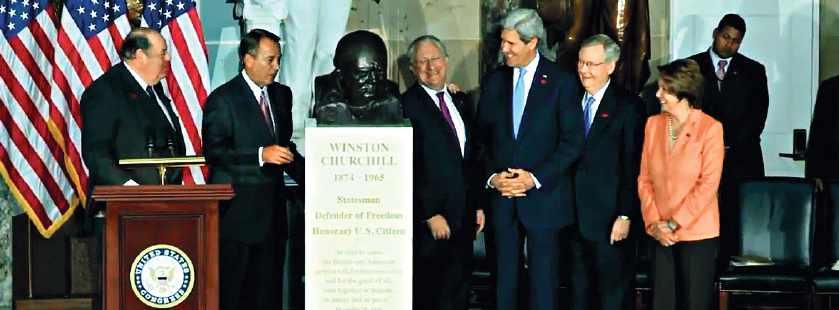
run the Holiday Inn group’s International organisation in Memphis, Tennessee.
Geller’s eldest daughter Tanya, who was five at the time, had a serious heart condition, and the company had offered to help with treatment at a top cardiology specialist in Houston, so Geller, his wife and their two children emigrated to the States and he took the job.
“I thought we would be there for two years. It ended up being 40 and our third child was
born there.” He says: “I looked after Holiday Inn then set up my own business and bought a bunch of Holiday Inns. I made a lot of money and lost a lot of money.” He subsequently served as the chief operating o cer of Hyatt Development Corporation.
After a near-death experience in the early 1990s, in 1996 he founded the multinational high-end hotel owning company Strategic Hotels & Resorts, which he took public on the NYSE in 2004 but exited in 2013 after a
“nightmare few years of surviving the recession and rebuilding the business”.
He explains: “I had split from my wife after 40 years, the stock market crashed, I was in debt and the company was close to bankruptcy.” But Geller managed to build it back up and at the end of 2015, Strategic Hotels and its portfolio of 17 hotels was bought by Blackstone for $5.5bn.”
In 2010, Geller took up a position as chancellor of the University of West London,
where he had studied, and soon realised that he wanted to create a new model of dementia care in the UK together with his son, Guy, the company’s co-director. Guy has served on the board of the Illinois chapter of the Alzheimer’s Association while Geller chaired the national fundraising campaign for the Alzheimer’s Society (UK). In 2018 he decided to move back to London.
While Loveday is Geller’s passion and takes up a majority of his time, he remains chancellor of the University of West London, where he received a lifetime achievement award in 2009, and still runs Geller Capital Partners, a property investment company based in Chicago, the University being among his significant philanthropic commitments. He believes that we “make a life by what we give” and says there are big di erences between the UK and the US when it comes to charity.
“In the US, philanthropy has tax benefits and is ingrained in the business culture with people seeing it as their duty to support di erent communities and organisations but in the UK, well, business people can be pretty crappy, and will maybe pick one or two charities, not a wide range and often don’t come to the charity dinners.”
For Geller, success is not just about the bottom line; “It’s about blending business with philanthropy and leaving the world a better place than when you found it.”


020 8194 6194
info@myhousing.co.uk www.myhousing.co.uk
Experience a hassle-free renting process using My Housing's rent guarantee model, where personal service seamlessly intertwines with professional excellence.
Our dedicated team ensure that landlords receive unparalleled support, from rent guarantee solutions to meticulous property care
Client feedback
It’s really important to me that my properties are kept in good order, and I comply with the regulations. My Housing have made sure that this is the case. Louise, Landlady, 5 Properties

YOUR RENTAL INCOME GUARANTEED FOR UP TO 5 YEARS NO VOIDS. EVEN IF YOUR PROPERTY IS VACANT
NO MANAGEMENT FEES
YOUR PROPERTY RENTED WITHIN 48 HOURS POST INSPECTION ANY MALICIOUS DAMAGE COVERED YOUR RENT PAID ON TIME
Call us on 020 8194 6194 and quote ‘JN1’

BY AVIVA GOLDSCHMIDT KAUFMANN PARTICIPANT ON THE UNITED SYNAGOGUE’S MA’ALEH PROGRAMME FOR WOMEN
This week’s parsha, Ki Tetze, delves into a variety of laws that apply to a people on the brink of entering the Promised Land and establishing their own sovereignty. Among these are the prohibition of keeping a poor person’s collateral overnight. This would often be a cloak, which would be needed for warmth and rest.
One is also forbidden from taking the millstone as collateral because taking it could jeopardise a person’s ability to make a living. The Torah provides instructions on how to ensure the rights and dignity of
the widow, the orphan, the poor person and the hired worker and emphasises accuracy in weights and measures. The sedra concludes with the commandment to blot out the memory of Amalek, our ancient adversary who, undeterred by fear of God, attacked the Israelites by surprise from the rear as we left Egypt. But why does this section about Amalek appear here just after these laws, seemingly standing alone? And what does it mean to blot out Amalek in today’s world?
When examining the laws in this parsha, we notice that many concern vulnerable people and those on the fringes of the community. These individuals often lack property and face marginalisation in society.
Regarding weights and measures, the customer is vulnerable in his or
her reliability on the merchant not to overcharge them.
The Torah’s legal system stands out for its concern for the vulnerable – a compassion unparalleled in the Ancient Near East. The already existing legal systems of that time, for example the Code of Hammurabi, a legal text from Ancient Mesopotamia, favoured the wealthy. The powerful had legal recourse, while the marginalised struggled. The Torah disrupted this pattern by prioritising justice for all, regardless of social status.
So what does this have to do with blotting out Amalek? In their attack on the Israelites as we were leaving Egypt, the Torah tells us the Amalekites targeted the weak, the weary, and the vulnerable – the stragglers at the rear of the procession. They preyed on those who lagged behind,

exploiting their fatigue and desperation. Yael Ziegler writes: “Devoid of moral compunctions, Amalek cares nothing for those who are not useful at the moment.” Their assault was not merely physical; it aimed to weaken the spirit, to extinguish hope. Rabbi Levi Yitzchak of Berdichev, who lived in 18th century Eastern Europe, suggests that Amalek is not just an external enemy; it resides within every human heart. It represents our capacity to disregard the vulnerable,
to exploit their weakness. To blot out Amalek, we must confront this inner callousness by cultivating compassion, empathy and justice.
I feel proud to be part of the Jewish community, where we support organisations that help the vulnerable, such as providing support to teens in trouble, concrete and discreet help for the bereaved and the unwell, and care for the elderly. This week’s sedra is a reminder that this should always be a focus in our community.















BY RABBI KATH VARDI CO-CHAIR OF THE ASSEMBLY OF REFORM RABBIS & CANTORS
In the book of Kohelet we read, ‘There is nothing new under the sun’ (1:9). It would be easy this year to feel fully the force of this rather pessimistic saying. As we step into the year 5785 we recognise that, rather than settling or renewing, the world feels increasingly unsettled for many. In such circumstances it can be tempting to allow hope to give way to cynicism, to protect ourselves from bitter disappointment and hurt by pre-deciding that there is little point in working towards anything di erent.
But this is not the Jewish way. Judaism is a religion of liberation. We are a religion that recognises that while we may never reach the promised land, we must always work towards it – towards a world of peace and stability which has justice at its core.
The utopian vision set out in the Torah, and most strongly in the words of the prophet, focuses on the needs of the vulnerable which, they demand, must be protected. To stand with the vulnerable requires courage as we are asked to be the carriers of hope, sometimes against a background of fear and discontent.
This relentless commitment to hope and change, alongside the
Receive the best prices for your unwanted gold today! Call Jonathan 020 8446 8538
9 ct per gram - £22.21
14 ct per gram
obligation to care, is the power of the High Holy Days. They are our season for self-reflection and adjustment. They are the days where we take a sincere look inwards and ask ourselves key questions.
What do I want to be di erent? What do I want to do di erently?
On the surface these questions may seem simple, easy even. To answer them with honesty and vulnerability takes courage. We are being asked to embody ometz lev – courage of heart.
The High Holy Days are asking us to take the risk of changing our habits and breaking the patterns that may no longer serve us. We are not promised a guarantee that the changes we seek to make will succeed, nor that they will be simple, but our willingness to show up, in all our uncertainty, changes us, and it is this possibility of growth that is such a powerful promise of the High Holy Days.
With this internal work of hope, challenge and change, we create a practice that can emanate out to the wider world. With these rituals we seek a chance at creating a world where justice rules and through our vulnerability, we are able to not only care for the vulnerable but to work towards a time when none are vulnerable and all are equal. May the year ahead be one full of possibility and one where hope, not cynicism, prevails.
Written by Rabbi Kath Vardi on behalf, and with the input, of all four co-chairs of the Conference of Liberal Rabbis and Cantors and Assembly of Reform Rabbis & Cantors
A stimulating series where our progressive rabbis consider how Biblical figures might act when faced with 21st-century issues









Our trusty team of advisers answer your questions about everything from law and finance to dating and dentistry. This week: Help with telephones for people with hearing loss; the ‘golden rule’ for making a will; managing business cashflow

Dear Sue
SUE CIPIN CHIEF EXECUTIVE JEWISH DEAF ASSOCIATION
I hope you can help me. My mum lives alone and can’t get out. She often doesn’t hear the phone ring and I panic when I can’t get hold of her. When she does answer, she can barely hear me and it’s so hard to have a conversation.
Thanks Michelle
Dear Michelle
Yes, we can help – our home visiting service is for people just like your mum.
We’ll send someone to visit her at home to demonstrate amplified phones with loud ringers. She’ll be able to try them out and see


CAROLYN ADDLEMAN
DIRECTOR OF LEGACIES
KKL EXECUTOR & TRUSTEE CO
Dear Carolyn
My uncle, who had no children, died a few months ago and named me as his executor. His nephew, who had a poor relationship with him, is threatening to challenge the will, under which he doesn’t benefit, due to lack of capacity.
Colin
Dear Colin
Although you don’t mention it, I will assume your uncle’s nephew would inherit on an intestacy if the will was set aside. This shows the importance of following the ‘golden rule’ when drafting a will – the draftsman should ensure that all older testators have the necessary capacity and obtain a detailed report from a medical practitioner when preparing the will. Research shows that one in 11 people over the age of 65 have some form of dementia and that more than 900,000 people within the UK have some form of the condition.
In a recent case, a solicitor who took instructions from a 90-year-old for the making of a will without taking any proper steps to satisfy himself
which one she hears best with. They’re much louder and clearer than ordinary phones ,so she’s likely to notice a big di erence.
If she decides to buy a phone, we’ll help her to order one for delivery to her home address. Once it’s installed, we’ll visit again and make sure she knows how to use it.
Do let us know if your mum is struggling with anything else, such as hearing the television or simply having a conversation. We’ll take along whatever she needs to try, and we’ll explain patiently how to use it.
If social services can provide any of the equipment she would benefit from, we can also make a referral to them to make sure she gets everything required to help with her hearing loss.
Please call Gabrielle at JDA on 020 8446 0214 or email gabrielle@jdeaf.org.uk.
We look forward to helping your mum and alleviating stress for the whole family.
as to the man’s capacity was severely criticised by the judge. The will was subsequently successfully challenged on the grounds of a lack of the necessary capacity.
The testator must be aware of his or her aims, understand the value and composition of the estate and appreciate any moral claims there may be on it. It must be clear that they do not have any mental condition that might impair their willmaking ability.
The golden rule is intended to protect the wishes of the testator and avoid a situation such as you have described. When making a will ,it is advisable to consider giving the draftsman authority to write to your GP for confirmation of testamentary capacity.

ADAM SHELLEY ACCOUNTANT
SOBELL RHODES LLP
Dear Adam
I have recently set up a new business and need some support in managing cashflow effectively. Can you provide any guidance?
Sarah
Dear Sarah
Managing cashflow e ectively is critical for the survival and growth of your business. It’s about planning, monitoring and controlling the money coming






MOVING TO ISRAEL? We are still shipping full containers and part loads to most areas of Israel.
in and going out of your business, which ensures you have enough cash to cover expenses and avoid insolvency. Given the nature of the economy and evolving business practices, staying updated with the latest tools and strategies is vital.
The first step is to understand how cashflow works in your business. This involves knowing when and how your income and expenses occur.
Create a cashflow forecast that includes all expected inflows (from sales, accounts receivable and so on) and outflows (such as operating expenses, inventory purchases and any loan payments). This forecast should be updated regularly to reflect actual figures and revised projections.
Accelerating the inflow of cash is crucial. You can do this by invoicing promptly, o ering payment incentives, implementing payment terms and streamlining processes.
Maintaining a cash reserve is a strategic financial safety net for your business, designed to shield against unforeseen cashflow dips.
Assessing your current financial status can give you a plan aimed at improving your cashflow including reducing unnecessary expenses. Additionally, insights can be provided into tax e ciencies to ensure you’re not overpaying, thereby improving your overall financial situation and enabling more informed decision-making for sustained growth and to benefit personally.
TREVOR GEE
Qualifications:
• Managing director, consultant specialists in affordable family health insurance
• Advising on maximising cover, lower premiums, pre-existing conditions
• Excellent knowledge of health insurers, cover levels and hospital lists
• LLB solicitors finals
• Member of Chartered Insurance Institute
PATIENT HEALTH
020 3146 3444/5/6
www.patienthealth.co.uk trevor.gee@patienthealth.co.uk

DONNA OBSTFELD
Qualifications:
• FCIPD Chartered HR Professional
• 25 years in HR and business management.
• Mediator, business coach, trainer, author and speaker
• Supporting businesses and charities with the hiring, managing, inspiring and firing of their staff
DOHR LTD
020 8088 8958
www.dohr.co.uk
donna@dohr.co.uk

ADAM SHELLEY
Qualifications:
• FCCA chartered certified accountant
• Accounting, taxation and business advisory services
• Entrepreneurial business specialist including start-up businesses
• Specialises in social media influencers and sport sector including tax planning and financial management
• Maurice Wohl Charitable Foundation Volunteer of the Year JVN award
SOBELL RHODES LLP 020 8429 8800 www.sobellrhodes.co.uk a.shelley@sobellrhodes.co.uk

LISA WIMBORNE
Qualifications:
Able to draw on the charity’s 50 years of experience in enabling people with physical disabilities or impaired vision to live independently, including:
• The provision of specialist accommodation with 24/7 on-site support
• Knowledge of the innovations that empower people and the benefits available
• Understanding of the impact of a disability diagnosis
JEWISH BLIND & DISABLED 020 8371 6611
www.jbd.org
Lisa@jbd.org

ILAN RUBINSTEIN
Qualifications:
• UK born, licenced Israel estate agent in Israel since 2001
• Ilan assists in buying, financing & re-sale of new & existing property in Israel.
• Helps level the playing field opposite vendors, developers & even the bank
• Attentive to your needs, saving you time, hassle & money

I.L.A.N. ESTATES & INVESTMENTS “Bringing Jews Home” UK: 0203-807-0878 ISRAEL: +972-504-910-604 www.ilanrealestate.com nadlan@hotmail.com

JONATHAN WILLIAMS
Qualifications:
• Jewellery manufacturer since 1980s
• Expert in the manufacture and supply of diamond jewellery, wedding rings and general jewellery
• Specialist in supply of diamonds to the public at trade prices
JEWELLERY CAVE LTD 020 8446 8538 www.jewellerycave.co.uk jonathan@jewellerycave.co.uk

CAROLYN ADDLEMAN
Qualifications:
• Lawyer with over 20 years’ experience in will drafting and trust and estate administration. Last 14 years at KKL Executor and Trustee Company
• In close contact with clients to ensure all legal and pastoral needs are cared for
• Member of the Society of Trust and Estate Practitioners
KKL EXECUTOR AND TRUSTEE COMPANY 020 8732 6101 www.kkl.org.uk enquiries@kkl.org.uk


STEPHEN MORRIS
Qualifications:
• Managing director of Stephen Morris Shipping Ltd
• 45 years’ experience in shipping household and personal effects
• Chosen mover for four royal families and three UK prime ministers
• Offering proven quality specialist advice for moving anyone across the world or round the corner
STEPHEN MORRIS SHIPPING LTD 020 8832 2222 www.shipsms.co.uk stephen@shipsms.co.uk

JACOB BERNSTEIN
Qualifications:
• A member of the APCC, specialising in financial services compliance for:
• Mortgage, protection and general insurance intermediaries;
• Lenders, credit brokers, debt counsellors and debt managers;
• Alternative Investment Fund managers;
• E-Money, payment services, PISP, AISP and grant-making charities.
RICHDALE CONSULTANTS LTD 020 7781 8019
www.richdale.co.uk jacob@richdale.co.uk

DR BEN LEVY
Qualifications:
• Doctor of psychology with 15 years’ experience in education and corporate sectors
• Uses robust, evidence-based methods to help you achieve your goals, whatever they may be
• Works with clients individually to maximise success
MAKE IT HAPPEN 07779 619 597 www.makeit-happen.co.uk ben@makeit-happen.co.uk

SUE CIPIN OBE
Qualifications:
• 24 years+ hands-on experience, leading JDA in significant growth and development.
• Understanding of the impact of deafness on people, including children, at all stages
• Extensive services for people affected by hearing loss/tinnitus
• Technology room with expert advice on and facilities to try out the latest equipment.
• Hearing aid advice, support and maintenance
JEWISH DEAF ASSOCIATION 020 8446 0502 www.jdeaf.org.uk mail@jdeaf.org.uk









We purchase a wide range of Antiques, including Furniture through the ages, from Georgian, Regency and Victorian, to the more rare 20th century modern pieces. We also specialise in diamond jewellery, gold, silver, and paintings of any period, with an emphasis primarily on quality.
If you would like advice or to sell direct, do get in touch. Selling direct eliminates the high commissions involved with auction houses. In fact, we encourage sellers to obtain an auction estimate before contacting us, to be certain of receiving the best possible price.
Payment is immediate, by cash or Bank Transfer and we collect free of charge. We are here to help.
Please call Sue for a free valuation on: Freephone 0800 840 2035. Mob: 07956 268 290. email: antiquesbuyers8@gmail.com. Visit our website for more details: www.antiquesbuyers.co.uk





Antique – Reproduction – Retro Furniture (any condition)
Epstein, Archie Shine, Hille, G Plan, etc.
Dining Suites, Lounges Suites, Bookcases, Desks, Cabinets, Mirrors, Lights, etc. House clearances
Single items to complete homes
MARYLEBONE ANTIQUES - 8 CHURCH STREET NW8 8ED 07866 614 744 (ANYTIME) 0207 723 7415 (SHOP)

YOU CONTACT US BEFORE SELLING

Friendly Family Company established for 30 years
We clear houses, flats, sheds, garages etc. No job too big or too small! Rubbish cleared as part of


Confidential Bereavement Counselling for adults and children individually. Support Groups available. We offer in person, online and telephone counselling. Contact Jewish Bereavement Counselling Service in confidence. 0208 951 3881 enquiries@jbcs.org.uk | www.jbcs.org.uk CHARITY & WELFARE
Sheltered Accommodation
We
Ealing,
and

lawmentor@btinternet.com / 07590 057097

For more information contact Tom lawmentor@btinternet.com / 07590 057097










11 Female rabbit (3)
12 Morally proper (7)
9 Precisely (7)
Fill the grid with the numbers 1 to 9 so that each row, column and 3x3 block contains the numbers 1 to 9.
Fill the grid with the numbers 1 to 9 so that each row column and 3x3 block contains the numbers 1 to 9.
11 100 centavos, in Mexico (4)
13 Blue Shoes, Presley song (5)
14 Culinary pulveriser (6)
16 Plus (2,4)
19 Farmland units (5)
21 Make more secure (7)
23 Try to win the affection of (3)
24 Sudden thrust (5)
25 Take away (7)
26 Tending flocks (11)
2 Dog’s restraining chain (5)
3 Appendix to a will (7)
4 Wax light with a wick (6)
12 Areas of tissue behind the nose (8)
15 ___ Walters, Billy Elliot actress (5)
Join forces (5)
Old ___ Hen, traditional cask ale (8)
Weasel-like animal (4)
Mechanical, without emotion (7)
Pull up (5)
Top of a building (4)
Nut-tightening tool (7)
Condiment traditionally eaten with lamb (4,5)
Race circuits (4)
Surrenders or concedes (6)
Medic, in short (abbrev)(3)
5 ___ basket, wickerwork carrycot (5)
6 Bishop’s area (7)
7 Signal to take action (4-2,4)
10 Of clothes, reaching the middle of the leg (4-6)
15 Squash (7)
17 With vision (7)
1 Uses (7)
(a
with brass bands can all be found in the forwards or backwards, in a horizontal, direction, but always in a straight, unbroken line.
Governed (5)
Pens for hens (5)
Canopy (6)
18 Heavy uninteresting food (6)
20 Lottery (5)
22 Practise for a feat of endurance (5)
The listed words related to gardening can all be found in the grid. Words may run either forwards or backwards in a horizontal, vertical or diagonal direction but always in a straight unbroken line.
Relying on gut feeling (9) 14 Receipt of admission (6) 17 Storm in a ___, a lot of fuss over nothing (6) 18 Satirical sketches (5) 20 Snap taken by a camera (5) 22 Shere ___, The Jungle Book tiger (4) 24 No longer operative (3)
In this finished crossword, every letter of the alphabet appears as a code number. All you have to do is crack the code and fill in the grid. Replacing the decoded numbers with their letters in the grid will help you to guess the identity of other letters.
Each cell in an outlined block must contain a digit: a two-cell block contains the digits 1 and 2, a three-cell block contains the digits 1, 2 and 3; and so on. The same digit must not appear in neighbouring cells, not even diagonally.
Each cell in an outlined block must contain a digit: a two-cell block contains the digits 1 and 2 a three-cell block contains the digits 1 2 and 3; and so on. The same digit must not appear in neighbouring cells not even diagonally.
In this finished crossword every letter of the alphabet appears as a code number. All you have to do is crack the code and fill in the grid. Replacing the decoded numbers with their letters in the grid will help you to guess the identity of other letters.
puzzle solutions.
Sudoku Suguru
6
5
